#they needed an ''army'' of sorts of generic hero characters that could show up in the levels and stuff that had some connection to shadow
Note
in maria’s defense, she was just a child who had yet to understand the inherit evils of the government until it was too late
yeah i know that, im not blaming it on her or anything its just ironic to hear the character who would literally be killed by them talk about how brave they are and stuff
#asks#one detail i dont like about shadow the hedgehog is how they try to convince the player that gun are the good guys#and its not just marias dialogue that implies this#in the morality system attacking gun soldiers is an inherently bad action that makes your dark meter go up#and sometimes when you attack them while working with hero characters theyll scold you for it#like ''hey what are you doing theyre on our side'' or ''stop those are the good guys'' or ''they didnt do anything wrong leave them alone''#all this is especially annoying when theyre doing it in the game where shadow is the main character#you know. the guy whos whole tragic backstory was caused by gun being shitty and corrupt#also even in shth where they try to tell us gun is good theyre still constantly shooting at you no matter whos side youre on#yeah real heroic behavior there (sarcasm)#and i GET that alongside the black arms and eggmans robots#they needed an ''army'' of sorts of generic hero characters that could show up in the levels and stuff that had some connection to shadow#and gun was probably the only thing they could think of#but still. dont really like the implications there
8 notes
·
View notes
Text
I know I might get bashed like hell for this but I don't care: Chat Noir and Ladybug are realistically the weakest Cat and Ladybug miraculous holders of their respective legacies.
And it's not just them. Every single Parisian hero of the current generation, from Rena Rouge to Viperion, are significantly weaker in terms of skill and power than their predecessors.
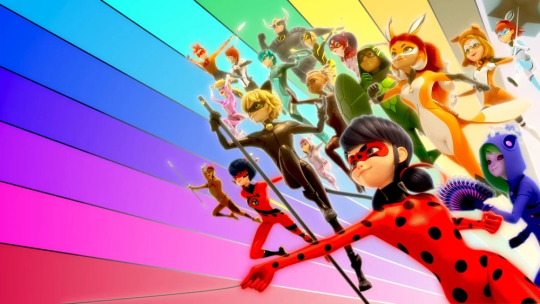
This isn't their fault entirely, as Ladybug and co have more disadvantages than the heroes that have come before them and there are those who don't take the job seriously [Chat Noir and Queen Bee].
They're Very Young
The first most glaring issue is the fact that they are still minors. The most consistent rule of the show is that a miraculous being used by a child is like the free trial version of a streaming service. Five minutes after using their special power, they will de-transform and will need to feed their kwami to resume their transformation. Unlike Hawkmoth and Mayura who can keep up their transformation even after using an akuma/amok, Ladybug and Chat Noir have to proceed with caution because they aren't grownups which limits their ability to fight all out. This is especially the case with Chat Noir and Ladybug as they are the main superheroes and characters used to emphasize this rule.
If the wiki is to be believed, then previous Ladybugs like La Déesse Coccinelle, Piao Chong, Tentomushi, Jeanne d'Arc (in the mlb universe), and Mudangbeolle were all adults according to their respective time periods and didn't have the same restrictions that the current Ladybug has. The same could be said about previous foxes, bees, turtles, snakes etc.
They Lack the Necessary Training
The second drawback that Marinette and Adrien have are their backgrounds. More specifically, their comfortable lifestyles. Marinette in particular, went from a clumsy girl who lived a normal life to a beloved superheroine in just one day. Not that there's anything wrong with that on a character level, but on a logical level it makes sense for her to be ill prepared for the duties of a hero at first. She was thrusted into it suddenly with no training [something I see is regularly addressed in crossover fanfictions with Batman and the DCU] or any background in combat, the latter she had to learn on her own. Though it's hinted at that Sabine is an exceptional fighter, it's pretty clear that she taught none of it to Marinette.
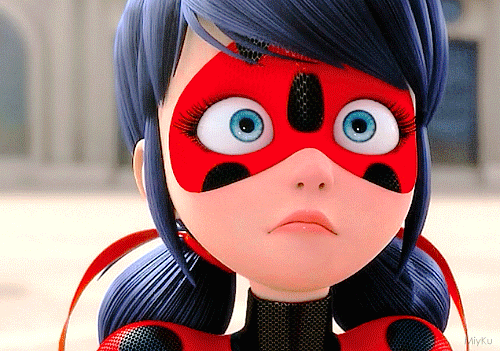
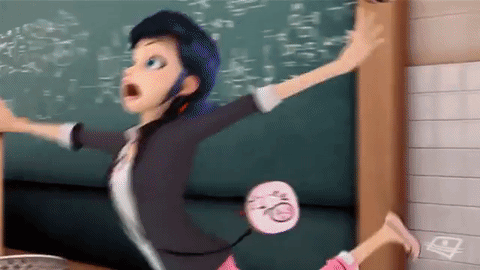
Adrien at least has some combat training in the form of fencing which is evident in the way he uses his staff like a fencing saber. But as someone who has been fencing since I was seven and been up against many talented opponents, Adrien strikes me as mediocre at best. He beats Kagami in Riposte sure, but by real fencing standards Adrien would be slaughtered by someone who had been trained their entire life to be an Olympic worthy fencer [Kagami].

I'm bringing this up because literally every past Ladybug, Black, and others have experience in combat, were vigilantes in armies, were warriors before using their miraculous, or fought in actual wars therefore becoming hardened veterans. In this category Adrien [again, even though he's mediocre] and Kagami are the only heroes of the current generation who have previous training in the form of a combat-oriented sport. Though, in my opinion, Kagami as Ryuko is the only hero that can hold a candle to her predecessors.
Alya, Nino, and Chloe are also very weak in this regard due to the aforementioned reasons above. They all have comfortable lifestyles and were thrusted into the world of heroes without any training or focus. Chloe nearly ran into a wall because she wasn't paying attention and Alya needed to be guilt tripped into giving the miraculous to Ladybug by Trixx. You can make the argument that the miraculous costumes make up for their lack of actual experience, which is 100% valid, but I can also argue that having battle training or any sort of athleticism can make a hero even more effective. I don't know if this is an unpopular opinion, but Kagami will always be the most effective and skilled temporary hero as evidenced by her being able to piece together her transformation phase, her attention to detail, her impressive battle awareness and her ability to right her mistakes [jumping into the fight without listening to Ladybug's plan in Ikari Gozen] with her quick thinking. Say what you will about her, but Kagami is objectively the best candidate to be a permanent hero, especially since Chat Noir has been demoted to sidekick/temporary hero status.
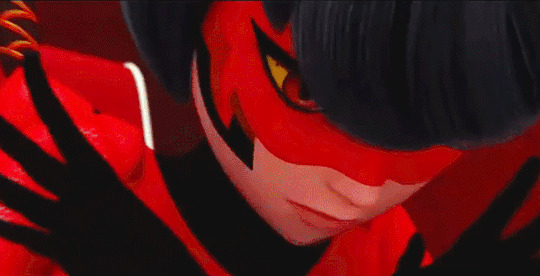
[Kim is also an athletic person, but his skill is in swimming, which isn't helpful unless he has an aqua form, which he doesn't so ehh]
They Have Little to No Knowledge of Their Own Powers
The third thing that the heroes have going against them is their lack of knowledge about their powers. By this point in the series, the heroes are just going with the flow and figuring things out for themselves as they go along.
As we know, these are the first heroes since the Order of the Guardians was destroyed. This context is important because in Feast, we learn that countless grimoires and Miracle Boxes burned away or eaten.
youtube
The miraculous date back to Ancient Times so there had to have been thousands of years of documented information about the miraculous of the Chinese Miracle Box. I'm not even going to say it's an assumption. It has to be a fact that there were secrets about each miraculous including how to train each Guardian that would have been extremely helpful to Ladybug and the others if they had access to it. Master Fu is responsible for tens of thousands of years' worth of knowledge being snuffed out in just one night.
This puts the heroes who wielded a miraculous after the Order was destroyed at a significant, almost sad disadvantage to those who were heroes before the Order fell. It's highly likely that after gaining their miraculous, previous heroes had access to the archive in which they could learn to utilize their powers to their absolute fullest potential. Whereas with the current heroes, it feels like they can only use a fraction of their miraculous's abilities.
Another problem with their lack of knowledge is the time separating Ladybug and Chat Noir from their predecessors. Bo Rua and an unnamed Vietnamese Black Cat were the last LadyCat duo before Feast swallowed the Order, with Adrien and Marinette being their immediate successors. However, Master Fu was confirmed to be in his 180s when he relinquished the Miracle Box to Marinette and Austruc confirmed Bo Rua and her partner to be in their early twenties, meaning that Bo Rua and LadyNoir have over 200 years separating them, confirming that their knowledge was lost over time after they died and can only be recovered by speaking to their spirits like in Reunion [which I have several complaints about]. Master Fu is obviously lacking knowledge about the miraculous to a severe degree, so it makes sense for Chat Noir and Ladybug to as well.
I'm not bashing Adrien and Marinette and co for being objectively weak because it makes so much sense. They lack proper training, they're kids with set limits on their powers, and they don't have access to crucial information that would've probably led them to defeat Hawkmoth by now. Sure, the two of them [more so Marinette] are the strongest heroes of their generation but if you put them up against their forebearers, they would be massacred with no difficulty whatsoever.
The show would be 100 times more interesting if this was acknowledged, which would lead to the introduction of the previous holders in a more natural and useful way.
[If I missed anything, any reblogs with your personal opinions on the matter will be very appreciated]
#ml salt#ml writers salt#miraculous ladybug#cat noir#adrien agreste#marinette dupain cheng#ladybug#adrien salt#it's very minor but still#Youtube
30 notes
·
View notes
Text
i wrote an outline. it gets fuzzier as it goes. idk if this would actually be good but it seemed fun in my brain
rpg game
ACT 1
somewhat basic rpg set up. ragtag group of adventurers get together and do quests. maybe an adventurer's guild set up? fear of demonic forces attacking? demon king??
MAIN PARTY
the leader. a sparkling, chivalrous knight. even when the party bickers, they believe in his vision. blonde, blue eyed white man. (maybe? might be a little too obvious. maybe throw some silver hair in there) extremely classic stereotypical hero.
the ice queen. main spellcaster of the party. beautiful woman. cold. hard to get along with. her powers are innate, and though her fighting ability is on par with the rest of the team, her powers are stronger than they seem. but hard to control. maybe has an outburst somewhere that shows how powerful she can be. bickers the most with the rogue character.
cleric. short, cute, bubbly. pink hair? the light of the party. bit of a comic relief character possibly. was a woman in my dream. could be a guy, but maybe a generic harem set up in act 1 would make act 2 more interesting?
rogue. in my dream this was a man, but i'm thinking a woman would be more fun. cynical, smart-mouthed, but has a soft side. for all her whining, genuinely wants to save people. maybe attracted to the hero in act 1? the main thing about act 1 that makes this seem less generic is that the story is from the rogue's pov.
most of act 1 is the party settling together and doing quests, maybe finishing one involved story quest that makes the adventurer's guild trust them a little more. maybe people are being abducted from town and our team figures it out? doesn't super matter, mostly just trying to establish characters and dynamics.
once things are settled, a quest comes in. the party goes to investigate a cave where there are rumors. maybe of whispering voices, maybe of strange demonic forms, something. they get there, and they find a demonic army is getting ready to pass through. (there's a cave in that the party doesn't realize. should the player know? not sure) a grand demon attacks them. extremely difficult boss. not sure if it should be unbeatable for cinematic reasons, or should be worthy of the final boss of act 1. either way, it's a hard fight.
at the end of the fight, the grand demon is still alive either way. in a cutscene, she has her last stand, attacking everyone in the party. the ice queen steps up and says she can do something about it. she can freeze the entire cave, sealing the party and the demons in a deathless sleep until help can arrive. (or maybe a time limit if the spell isn't broken?) the hero says to do it. the guild knows they're in the cave. surely help will come. it's difficult. she needs to be held up by the rogue to finish the spell. but she does it.
ACT 2
some time later, i'm thinking about a century later, the cave is reopened. or maybe not? maybe it's still sealed, and the spell just breaks? either way, the heroes and the demon all wake up in a far future, having never been rescued. the demon realizes what happened first. (somehow? maybe some sort of communication with the demon army is interrupted, maybe she has some way of knowing why? does she have a chatlog of her superiors trying to reach her as well as a current time on her demon iphone? lol) either way, she proposes a truce with the disoriented main party. when they find out how long it's been, the party breaks a few different ways.
the hero is fully despondent. everything he knew, everything he was fighting for, is gone. he becomes jaded and miserable. maybe even nasty. eventually leaves the party. (final boss? not sure yet)
the ice queen feels guilty, and isn't sure what she should do to make up for things. it breaks down her cold exterior, but makes her more erratic. cries a lot. tries to help people to the point of causing problems. class change? maybe doesn't want to keep using her abilities? maybe she gets religious and becomes a cleric? (or is the church evil this time? maybe a cleric of a demonic persuasion?) or maybe finds a wizened witch mentor in the woods to help her control herself, and becomes a more rounded spellcaster? hmmmmm
the cleric becomes more hardened. she lost a lot. but she's resilient. a contrast to the hero. do i go with my dream idea of having her go blind? hmm. either way i think i want to change her to a monk. get her punching.
the rogue, who had the least to lose as an orphan who never fit in and hated society, and who also had tons of debt, kind of feels free. takes on the protagonist mantle. keeps the party together. talks her way through the new world. (convinces the still-going adventurers' guild that their ancient id card is some kind of mistake or bullying attempt? like they printed it on old paper? maybe.) starts becoming more attached to the ice queen.
the demon joins the party?? i'm thinking that the new world is somehow more integrated with demon society. maybe the demon king did take over the country, but it wasn't the end of the world. maybe they're just people. maybe they had a genuine reason to end the country's previous government. maybe this realization is what makes the former hero drop out of the party, too in love with his dream of defeating the demon king to live in this new society. the new demon party member acts as ambassador and lore dumper. maybe takes over the hero's role in battle? maybe a tank? maybe she wore giant badass armor during the act 1 boss battle. oooo
act 2 is spent readjusting to the new society. maybe it has different technology? maybe it's more modern. hero leaves partway through main story quest. honestly, the dream ends about here.
[needs more story here]
ACT 3 (?)
maybe the hero has gathered up some kind of army? maybe he stole a powerful artifact in act 2 before he left? idk! all i know is the rogue and the ice queen get together. and maybe the demon and the cleric do too?? maybe it's unrelated to the hero???? maybe there's a complicated political plot in act 2 that leads you to realize that even though integrated demon+human society is good, the demon king is a problem??? down with the monarchy???? in this future maybe the hero comes back at the last minute and fulfills his destiny as the slayer of the demon king????? or maybe he does in his bad arc????????? WHAT IF TWO ENDINGS.............? based on rogue dialogue choices and doing certain sidequests that help the hero understand that demon society is fine actually.............................? who knows!
EPILOGUE
rogue and ice queen elope to a tropical island (?????)
#i didnt even get into the deal with the ice powers#in my dream she had something like an esper form like terra from ff6#is that a thing? who knows
2 notes
·
View notes
Text
The Complete Canonical Timeline of “Legends of the Starlight Hero”: Part 2
[[Character Breaking Information to Prevent Confusion: This whole thing is meta fan-fiction for @unpretty’s Astielle series, which is written as if it’s fan-fiction of a non-existent long-running video game series. This is my vision of what said game series might look at based on everything she’s written so far. Legend of Starlight Hero XII: The Gods of Astielle is the name of the ‘current game’ Astielle is supposedly fanfiction of. This is “written” shortly before its release. The first part of this exercise in metafictional self-indulgence can be found HERE. ]
Legend of the Starlight Hero (1985) [Nintendo/Atari 2600/Other] [Itokto]
[[A giant poster of the cover of Legend of the Starlight Hero I is hung up at a ComicCon. Someone dressed up like a giant Clippy-style sewing needle decked out in the Original Starlight Hero garb and wielding (an upsettingly well done considering the rest of the costume) Starlight Sword poses dramatically in front of it.]]
Legend of the Starlight Hero. The first. The original. The baffling origin of decades of magic and wonder and side-quests.
The plot is as simple as we're ever going to get. There's this big monster, you see. King of All Monsters, no less. He lives in this giant fortress-city called Monster Citadel on top of this giant mountain named Monster Mountain. From here, he sends out his Monster Armies to ravage and pillage the country-side. Only the holy weapons of the Celestial Sisters can defeat him, but he has those locked up deep in his Crypt of the Monsters.
But that's fine! You've got a sword, a devil-may-care attitude, and a nameless girl who can cast Shield over and over again. It's time to fight your way up all seven interlocking zones/levels of Monster Mountain while slaying Armies of Monster until you reach the Monster Citadel and unlock the Crypt of the Monsters and finally defeat The Monster King - King of All Monsters' once and for all!
Monster!
[[A mildly pixilated jpg of the back of the Legend of the Starlight Hero case. Each instance of the word Monster has been magnified and pixilated an increasing amount until the bottom of the box is just a series of overlapping jagged MONSTERs]]
And now that you know the plot, you don't ever need to play the game.
I'm serious. Don't play this game. Ever.
To explain why you shouldn't play the original Legend of the Starlight Hero, though, we need to talk about all the things that make it so janky. And in order to do that, we're going to need to get into its development. And to do that, we need to talk about one Ito Makoto. And to do that, we need autobiographical information about Mr. Ito, which we don't, because he was a man who never understood why people would be wanting to know about him when they could instead be knowing about all these neat games he was making.
But this is a rabbit-hole that needs going down; join me under the page-break for the whole convoluted tale. Or just ignore it and wait until I post the next part of the timeline which has 99% less biographical information on old Japanese men and 1000% more Jonys!
[[16-bit image of The Old Man of the Mountain from LotSH IV with a fox head 'shopped in]]
"Come, child. Witness what I have to show to you."
We start in 1982, Japan, at Itokto - a corporation of modest means which has found itself uniquely positioned to take advantage of the Video Arcade boom thanks to its holdings in electronics, data-storage, vending machines, and real-estate (among others). The founders, never ones to hesitate before jumping onto a new trend for however long it made money, had already put out a series of low-effort and simple arcade machines that were mostly in the time-honored genre "Like this thing you already know, but slightly different". The founders weren't stupid, however, and had their teams working on a second generation of arcade games with more polish and more budget that could stand on their own and be the sorts of things other companies would make cheep knockoffs of instead.
Into this environment arrives Ito Makoto, nephew of one of the founders, 42 years old, and recently unemployed from a career that no one seems to agree on the specifics of except for the fact it most definitely had nothing to do with computers, electronics, or games.
Despite this, Ito Makoto's uncle dropped him down into the middle of the second generation development and basically told the division heads to find something for him to do that would keep him out of the way, Because Nepotism. The division heads shrugged, gave Ito a little office off in the corner, handed him a game spec document, and told him to see what he could do with it. It would be 18 months before anyone checked in to see how he was getting along.
Due to the previously mentioned habit of Ito Makoto to never talk about himself if ever given the chance, there's very little primary sourcing on what exactly happened during these 18 months of solo-work. But based on what others said once they got involved afterwards, along with some basic extrapolation, inference, and a few shavings of Occam's Razor, it seems likely it went something like this.
Ito Makoto had never worked with computers (or electronics, possibly even machining) before in his life, but the same day he was handed his spec sheets, one of his few recorded interactions occurred with a co-worker. Said co-worker's recollection was: "Some new guy I didn't recognize came up to me and asked what script our games were written in. I told him Assembler, and he thanked me and wandered off. People across the office kept having their documentation vanish and then reappear a day or two later for months after, but at the time I didn't put two and two together."
(That doesn't read like a proper translation, but I don't read Japanese myself and Google Translate's attempt is even more garbage, so let's trust 'Xtreme Gamerz' magazine's version of events because it's all we got.)
After spending a month or two teaching himself Assembly language from the ground up via temporarily "borrowed" manuals, Ito got to work on the actual game. I've seen the scans of the original "Heaven's Heroes vs Monster Mountain" concept pages. (And their translations.) It looks like nothing so much as a Gauntlet knockoff; but seeing how Gauntlet was still two or three years away from even existing at this point, it probably would've made quite the splash if it was ever released. And I can only assume that at one point in time, Ito Makoto had a fully functional implementation of the spec programmed. But there are two things Ito Makoto would become known for. Being incapable of sticking to spec, and having an endless font of new ideas he’d keep adding to a project until someone else physically restrained him.
And so we come to 18 months later. The division heads were doing a roundup of all the game projects they had going on and someone remembered that they'd handed one of the specs off to the boss' nephew and they should check in on that one too just to keep all the ledgers looking balanced and aesthetic. I doubt any of them were prepared for what they would walk into.
Imagine a broom closet. A large one, but a broom closet. Big enough for a nice solid metal 80s work-desk, a nice clunky lead weight of a computer, some boxes, a bit of workspace. Now fill it with paper. Lots of sketches and drawings. Some of circuits, some of level maps and pixel-box layouts. Lots of colored pencil sketches of amazingy homoerotic monsters. Lots and lots of code and programming diagrams. All pasted over every available inch of wallspace. And in the middle of it all, a 43 year old man scribbling furiously in a notebook as he attempted to invent the video game inventory system from scratch for the second time.
It's almost a shame Legend of the Starlight Hero didn't finish development as an arcade-game. I mean, I understand why it didn't - it would've been an engineering disaster followed by a financial disaster - but it would've been glorious. Two joysticks, one to control The Hero, one to control The Heir. Each with three triggers. The one on top for the thumb would either attack or shield depending on if it was the Hero or the Heir it controlled. The second trigger (index finger) would flip through the inventory of powers and power-ups for each character. The third trigger (middle finger) would fire the currently selected power or power-up. You'd have to keep the Heir in position so that their shields and buffs would have line-of-sight to the Hero. You'd have to keep the Hero moving to prevent any monsters from being able to attack the Heir. There were endless levels. Ruined shrines, enchanted pools, a lava dragon nursery with erupting environmental hazards, there was a river where both Hero and Heir would have duel-control over a massive river serpent and have to keep him from crashing as you outraced murderous Abysscales. There was what I can only describe as a quick-time-event/rhythm game section when you break into the Crypt of the Monsters where you have to copy the posses of Goddess Statues. And a massive multi-stage boss battle against The Monster King at the end where he shape-shifted into each monster ever encountered before finally taking on his King Form (Impyr) for the final battle.
But it's 1984, and the list of technological reasons why this wouldn't work itself would create a text-file too large to fit on the storage arcade machines had available. Despite this though, there was no arguing that the mess of concepts and designs had promise. And Ito Makoto's uncle was just finishing a deal with a fellow Japanese game company about possibly porting some of their arcade games over to this new console that was about to release...
So it was Ito Makoto was assigned a full team to rework Heaven's Heroes vs Monster Mountain into Legend of the Starlight Hero. From what I've read, it seems 90% of their job was about keeping Makoto from sneaking back into the office at night to program in more features while the other 10% was spent cutting down what he'd already put in. Most of the existing ideas and concepts were cut, but that didn't stop Makoto from making use of them in the future. You probably recognize the River Serpent Chase from LotSH V, the "Lava Dragon" Nursery (now featuring three times as many Brutelings in bad dragon costumes) from LotSH IV, and the Goddess Statue pose matching as the foundation of the entire Starlight Beats series. Let it never be said Ito Makoto ever gave up a good idea without a fight. And come 1985, Legend of the Starlight Hero was released in Japan on the Famicom, and in North America on the "Whoever wanted to pay for the port rights, America's in a video game crash, it doesn't matter" systems.
Then, about eight months later, The Famicom is released in NA as the Nintendo Entertainment System, followed shortly by the first Black Drakonis game, and you can read on how the rest of that went all went a few entries back up. History!
Now, I've often (maybe five times) been asked, "Old Fox of the Mountain, in your sageous wisdom, where is the best place to play this, the origin of Astielle, so we may experience the magic from the beginning?" and I always answer, "Youtube. There's like five Lets Plays that actually manage to get all the way through and two of them even manage to beat The Monster King, King of All Monsters without cheats or quicksaves."
I mean, if you really want to, just hit up any ROM site, but you will throw your controller at something and I will not be held responsible. With only one D-Pad to work with, the Heir was given a cutting-edge-for-1985 AI to follow you around and not get hit by monsters and said AI does not work and your Heir will die. Repeatedly. And the attempt to work the inventory system "intuitively" with the pause menu will leave you trying to smite Taurils with your Star-Digger more often than not. And Karzarul's attack patterns are flatout bullshit. Don't subject yourself to that. It doesn't make you any less of a fan or 'gamer' to just skip out. Watch a Let's Play, laugh at their misery, and move on with your life. Or don't. I'm just an old fox on a mountain, what do I know?
We're already spent more time on Starlight Hero the First than on the rest of the games so far, but there're a few more side notes I feel it's important to cover.
First Side Note: Karzarul?
You might notice that there's no mention of Karzarul in the game. Or the phrase "Moonlight Monster". Or three goddesses. Or the reincarnation cycle. Or really anything. It's either a case of 90% of Mr. Ito's plot getting cut to cram it all into 384kb, or a case of massive retconning/expansion once everyone involved realized how many more of these games they'd be making. I personally assume both, but leaning heavily on the latter side, but I'll wait for Legend of the Starlight Hero IV: Heroes Reborn to get into the details.
Second Side Note: Needle?
Through this entire piece so far, I've been referring to the playable character of Legend of the Starlight Hero as simply “The Starlight Hero”. But everywhere else you look, he's called Needle. Further up in my Chronology list. In all the official documentation. In Karzarul's absolutely hilarious rant in Queen of All Monsters. Hell, Jonys has his "Starlight Sword in the Shape of a Needle That Wields Its Own Much Smaller Starlight Sword" trophy attack in Smash Brothers. So what gives?
Well, as I alluded to before, this was not a game designed with Story, Lore, or Sequels in mind. You had a Hero, you had an Heir, and there was no need to assign things like names or motivations or history to anyone involved. But the moment Heroes Reborn came out in '89, people needed a way to differentiate between this new Starlight Hero who had a name, and the original Starlight Hero who did not. I mean, you could always use Original Starlight Hero, but that's going to get old fast. And it did. Fortunately for everyone, the Atari 2600 port existed.
(One more historical digression. Porting games to different systems remains a pain in the ass, but back in the bad ol' days it used to be even worse. It was not unusual for the people in charge of porting a game to a new console to just reprogram it from the ground up in the native language rather than translate all the code manually. And it was not uncommon for teams who resorted to this approach to not be as good at programming as whoever made the original game. Exhibit A: The Atari 2600 port of LotSH.)
[[Gif of a five second loop of gameplay. A blocky, vaguely recognizable SLH slides along the ground without moving its legs, slashing its sword in front without moving its arms. The figure is only slightly wider at the shoulders than at the feet, and has a single eye in the middle of their head that is the same color as the background, giving the distinct impression of a hole in the middle of its head showing the ground behind/below.]]
With the speed of a Usenet connection, the Original Starlight Hero was slapped with the name Needle. Various in-universe justifications for the name were made by the fans to shore up support, and despite a belated attempt by the short-lived cartoon series to give him a proper moniker, it stuck. It probably helped that by the time the next main-line Astielle game came out, the franchise was under the control of Fantastico who had a much more casual approach to the property and made the Needle name official. It's commonly assumed, but unverified, that this was mainly at the insistence of Ito Makoto who found the whole thing fucking hilarious.
Third Side Note: Hey, Speaking of.... Ito Makoto?
Like I said before, Ito Makoto didn't speak much, if at all, about his personal life. He did have a wife who he was with from the age of 20 to his death; their relationship was apparently very close and loving. She moved with him to America during the Fantastico years, and has lived with his family back in Japan ever since his death. They never had any children. Ito Makoto also had a close male friend from his university years whom his wife called "Cousin" who lived with them, also moved to America with Makoto, and still lives in the same house there all three of them had before he died.
This does not necessarily mean anything.
Ito Makoto also drew all of the concept art for the first Starlight Hero game (and most of the art for the next four as well), and the art was... Well. Look, it's not uncommon to have Certain Sorts of Gamers come around complaining about how gay Starlight Hero has gotten. "Why are all the monsters so hot?" they ask, "Why does Karzarul move his hips like that?" they ask, "They weren't all sexualized and weird when I was a kid!" they say. Sometimes they even say that while taking control of the franchise for eight years. These Certain Sorts of Gamers have apparently never read the manual for Legend of the Starlight Hero I. All illustrations by Ito Makoto himself, and, well...
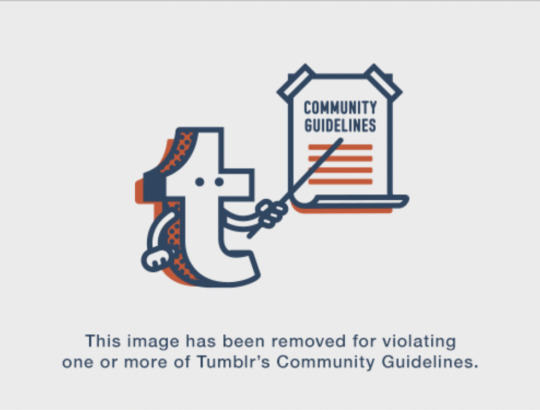
You've got the Taurils.

You've got the Abysscales.
[[A Bullizard lunges at the camera with a crystal spear. Both his tongue and pectorals are much longer/larger than they're usually depicted these days. Everything below the waist is shadowed, but suggestive.]]
You've got the Bullizards.

And of course you've got Impyres/King of All Monsters.
So the next time you get a Fake Gamer Boy bitching about how much attention has been spent on programming Karzarul's hip physics, just spam him some of these until he shuts up and goes away.
All of this also doesn't necessarily mean anything.
Speculation has it's place, but it's also important to remember that it was Makoto’s choice to be private. If there are any details about his private life that might deserve to be public knowledge, he has a surviving wife and a surviving 'long term live-in best friend' who are fully capable of making those details public if they ever decide it's appropriate. And neither of them have yet to do so. And Certain People need to stop being dicks about that.
And with that, we've reached the end of my write-up for this one single solitary game. Jesus.
Stars above! Let us continue this conversation another day, child.
Next time: More fun with Needle! And Jonys! And also more Joyns! Aaaand Joyns a few more times!
What can I say? They made a lot of Jonys games. And more of them are canon than some people might think.
Until then!
#Astielle#Unpretty#Metafiction#A month late because I had to rewrite this literally six times in a desperate attempt to make it shorter#Then I gave up#And you get all this#God I hope I gave him a legit Japanese name#Don't want a Sleve McDichael situation here
159 notes
·
View notes
Text
Dev Patel and the Green Knight
I finally got around to seeing The Green Knight. Overall, I enjoyed it--David Lowery does a good job capturing the essential weirdness of the tale, which is very much about taking a mundane circumstance (a Christmas feast) and suddenly catapulting the reader into a mythic otherworld through the intrusion of the alien and monstrous, and the fantastical costumes, dramatic lighting, and dissonant score all contribute very well to a sense of otherness that permeates the original story.
But I find it interesting--and, I'll admit, a little frustrating--that no modern film adaptation of medieval literature is really capable of taking the story it's adapting on its own merits. This isn't an objection to modifying the source text, or taking it in new, non-literal direction. I can think of plenty of adaptations of work that play with the source material in interesting ways, and are better for it. Even very faithful adaptations like Peter Jackson's Lord of the Rings are inevitably going to alter the source based on the need to adapt it for the screen and the whims of the director. But when it comes to medieval classics, texts like Beowulf or Gawain and the Green Knight are always held at arm's length. An ironic layer is always interpolated into the original story, and even in modified form the story is never allowed to stand on its own.
Contrast, for instance, modern retellings of Arthurian legend; or Wagner's Nibelungenleid; or something like Neil Gaiman's book of Norse mythology. These are all adaptations of much older stories, all medieval; and the authors typically happy to let the stories operate on their own terms. In fact, that is often a selling point: dipping into these tales is a way of sampling an alien culture, one that is remote from us in time rather than space, and part of the sense of heightened drama is the understanding that these stories do not necessarily depict the world in the same way that modern realist prose does. They are fairy-stories, in the Tolkienian sense, and something not quite even like "high fantasy," which, although it is a genre which owes much to the mythic tradition, is usually *told* in the same manner as other realist fiction. And you could take these stories and re-cast them in a realist mold--that's definitely been done with Arthurian legend, either via anachronism or trying to place them in an era-appropriate historical context, and even that yields something quite like the original in tenor, even if the language used to relate the story is often very different.
Watching this movie, I was *strongly* reminded of Robert Zemeckis's Beowulf, in that this did not feel like an attempt to adapt Gawain and the Green Knight for the screen. It felt like an attempt to tell a story *about* Gawain and the Green Knight (the text), a story which does not stand on its own. You don't have to have read the text to understand the movie (although I think some directorial decisions would be a bit mystifying if you hadn't), but the movie definitely situates itself *as a response* to the text. Which is an odd choice! Actually, another good point of comparison is Spike Jonze's Adaptation. It started life as an adaptation of Susan Orlean's The Orchid Thief, but Charlie Kaufman sort of gave up writing that halfway through and wrote a movie about the difficulty he was having writing *that* movie, and the result is something very weird (and very good) that is full of metafictional elements that depend on the existence of this other work, in a way that a straight retelling of The Orchid Thief for the screen obviously would not. And while The Green Knight isn't that extreme, it is definitely playing on the structure of the medieval poem, and replying to it.
The core of the movie (as I understood it) is a tension between young Gawain's aspiration to knightliness, his ambition which is born at least in part from his mother's encouragement, and his own failure to live up to the heroic ideal of greatness. Not chivalric--this is a movie in which the ethos of chivalry makes not even the briefest of appearance, which is weird given that it's nominally an Arthurian romance, and that the chivalric ethos is extremely important to the original text. Instead we have a generic greatness being described, one which is associated with renown, with taking part in mythic events, and with achieving high rank and honor. In the service of seeing her son obtain all this, Gawain's mother seems to cast some kind of spell, whereupon the titular Green Knight appears at Arthur's Christmas-feast; and as in the poem, a game of beheadings is proffered. Gawain accepts the challenge, beheads the knight, and the knight rides away, promising he'll meet Gawain a year and a day hence at the Green Chapel. So far so straightforward. When Gawain sets off a year later to meet the knight, his mother gives him an enchanted belt to keep him safe from harm. Gawain goes on to have a couple of side-of-the-road adventures and mishaps, the kind of thing that's par for the course when you're telling an Arthurian romance, until he arrives at the house of a mysterious benefactor, just about a day away from the Chapel, who grants him hospitality until the day of his challenge.
Now, in the original story, this is where Gawain gets the magic belt, and it's hugely important: Gawain and his host promise to exchange anything they might receive at the end of each day, when the host has been out hunting all day and Gawain has been in the house recuperating from his travels. During this time, the host's wife repeatedly tries to seduce Gawain; and Gawain is trapped between the imperative not to sleep with his host's wife (a major violation of the rules of good chivalric conduct!) and the imperative not to offend the woman (also a violation of those rules). He succeeds, for the most part; he is forced at one point to give his host a kiss at the end of the day, since the wife kissed him; this is shown as him holding nothing back and acting in good faith on the vow he made to his host. When Gawain finally rebuffs the wife for good, she insists that, even if he won't sleep with her, he should at least take a magic belt she has woven that will keep him from harm. He does; but he does *not* give this to his host. When he finally goes to the Green Chapel, the Knight returns the original blow as promised--but only nicks Gawain lightly. He reveals himself to be none other than the host who was sheltering him; the nick was his reprimand for withholding that final gift, but because of his good conduct he is otherwise left unharmed. The whole thing was a test of sorts, one which Gawain passed. Despite flinching at first from the blow, and keeping the belt secret, he shows himself ultimately to be a man of good (albeit not perfect) conduct, and *that* is why he wins honor from the whole affair.
The movie takes this basic narrative and alters it in key places, completely changing the valence of the whole thing. First, Gawain gets the belt at the beginning of his quest, as mentioned; he loses it on the way, but when he reaches the castle, the wife of his host (who succeeds in seducing him with a handjob) presents it to him as if she had woven it herself. He does not actually engage in the game of exchanged with his host, who is *also* not the Green Knight. And we're treated to a monologue about the color green from the wife that feels beat for beat like it's been ripped off from someone's undergraduate essay about Gawain and the Green Knight, which is a little weird even in the context of the rest of the movie. Finally when Gawain reaches the chapel, the knight goes to return the blow--and Gawain completely chickens out and flees. We are then treated to an extended sequence of Gawain returning home; being feted as a hero; earning his knighthood (presumably by lying about what happened); succeeding Arthur as king; him abandoning his low-class beau once she bears him a son, and marrying a princess; going to war; his son dying in a war; and finally, as an old man, being trapped in his throne room as a besieging army breaks its way inside. Just before they do, he removes the magic belt from around his waist, his head fall off, and bam--we're shown this has been an Occurrence At Owl Creek Bridge thing this whole time, and the Green Knight has not yet landed his blow.
Gawain finally takes off the belt, throws it aside, and tells the knight to go ahead--and the knight bends down and congratulates him. In context, the reading seems to be this: the belt is a talisman of Gawain's mother's influence, of external expectations for what kind of man he is. The Knight is Arthur or perhaps an agent of his, and the test in *this* case is whether Gawain can be his own person. All the events leading up to this point are perhaps a part of the original magic Gawain's mother cast, an effort to Lilith Weatherwax her kid to greatness by putting him into an epic story. Implicitly, then, the Gawain and the Green Knight we all know is the false version of the tale, the tale as Gawain's mother would have it told.
This is all very clever. But I'm afraid it's so clever it falls apart in the end. Because the structure of the original story that this depends on is dependent in turn on taking the whole notion of chivalric virtue seriously, which this movie plainly does not. Gawain is shown as irreverent and lustful and a bit of a party animal--lovable and good hearted fundamentally, but definitely not an Arthurian hero. That's fine, but that's a very modern sort of character, one that feels out of place in a movie that is trying very hard also to be tonally unmodern, firmly embedded in a mythic otherwhen of Arthurian legend. Moments of slice-of-life mundaneness, while charming, strain mightily against the epic tone the movie tries to take in other places, and strange events like a ghost seeking her lost head or immense giants striding the landscape. We are jostled: are we in the land of myth? Or are we in historical Britain? We cannot be in both!
And this is a movie that was definitely made by people who had read the original text; not just the original text, but also a great deal of criticism *about* the original text. The movie namechecks the theme of fivefold symmetry that's incredibly important to the structure of the poem; there's the aforementioned undergrad essay about colors about 3/4th of the way through; and there's the fact that the structure of the original plot (down to Morgan LeFay in disguise as an old woman in the host's castle) is present in altered form in every detail. But none of these details add up to much. There's a weird homoerotic kiss with the host that implies that in fact *he* wanted to sleep with Gawain, in addition to his wife; the ghost Gawain encounters early on tells him the Green Knight is in fact someone he knows (and therefore *can't* be the host; I think it's implied to be Arthur, like I said, but this is never quite confirmed), and while all these things *about* the original poem are shown, none of them ever get integrated thematically into the plot.
I think as a result, whatever Lowery was going for, the whole movie kind of falls apart in the end. And that's a pity, because somewhere in there is just a really weird, visually striking, really gripping, embellished-and-polished-for-modern-sensibilities-but-also-thematically-true-to-the-source retelling of Gawain and the Green Knight. And that would have been a much better movie! What are we to make of this, a movie that purports to be telling a story-behind-the-story, but one that leaves no room or context for the original? After all, Gawain in the end does *not* flee, does not return home a coward and a liar; presumably, he earns his honor, and can be honest about what happened. But if he is honest, none of the rest of what we have been shown makes a lick of sense, or has any point.
One feels a bit as if modern directors, when confronted with medieval texts being a bit weird, a bit alien in their worldview, instead of realizing that's actually something people like some of from time to time, feel like they have to construct an artificial bridge between the Middle Ages and the present day. But because it is invariably metafictional and self-referential, as if to say "don't worry, we know nobody REALLY wants to watch a bunch of boring medieval shit played straight," it comes off as cringing and ashamed of its source material. This isn't a plea for historicity! Gawain and the Green Knight is not history. But one does occasionally want to see an adaptation of one's favorite works without directors being ashamed of the text they are adapting! And since most people will not have read the original, I am rather confused about what the director intends for the audience to get out of all these references that are dependent on it, but don't stand on their own merits within the narrative of the movie itself.
The acting was good, the set design and costumes were terrific, I loved the slow and measured pacing and the weird score, and the design of the Knight himself, and the landscapes and almost everything else about the movie. So I don't think it's a waste of time, especially if you have read and enjoyed Gawain and the Green Knight, in the original or in translation. But it's definitely a pity to see a movie that was, well, *almost* great, but ended up merely OK.
#gotta put that undergraduate degree to work from time to time#we spent a *lot* of time on this poem
94 notes
·
View notes
Text
Ok so actually my biggest problem with the whole “Daenerys will burn KL” theory—not even the Mad Queen Dany theory, which is of course very sexist for obvious reasons, but just like, the idea that Dany will ~accidentally~ ignite the wildfire in the city, burning it all to the ground. That, at first, doesn’t sound that bad, but the longer I think about it the more I hate it because tbh it doesn’t do anything for her character? And also… that fate for her is just down right cruel.
Like, the most frequent argument I see on why this would be at all satisfactory for Dany’s arc is basically that it would be a sort of lesson for her about the dangers of unchecked power and the real threat the Dragons can pose on humans and that she shouldn’t use them to fight against other people. And that’s all well and good, excellent message… except that’s not something Dany’s ever really needed to learn? Not anymore that her fellow rulers, which I will touch on more detail later, but in general Dany has seen what the abuse of power can do. Starting with her conflicting feelings regarding Viserys and how she recognizes that even though he was her brother and she loved him, he also abused his power over her as her older brother, her only family and her king; she feels guilt about the atrocities Drogo committed to the lhazarene and tries to help them; she feels so much guilt about not handling things correctly in Astapor that she decides to throw away all her plans to go to Westeros and instead stays in Meereen.
And about not knowing the true danger that her dragons can pose? I mean, this is the same girl that literally agonizes across several of her ADWD chapters because Drogon killed a child, and then takes the extreme measure of caging Rhaegal and Viserion to prevent that from ever happening again. I think she’s at least a little bit aware that the dragons can be dangerous, thank you very much.
Ok so this got long...
Anyways, the only time Dany legit uses Drogon to harm someone and not just as bluff was at the house of the Undying, where she was being attacked, and in Astapor… and like, lmao, that asshole Kraznys mo Nakloz and the rest of his slaver buddies deserved it. Don’t at me. Also, Dany’s hardly the only one with a big magical and deadly beast at her disposal, why didn’t Robb had to go through some horrifying traumatic incident to learn he shouldn’t use Grey Wind in battle to tear his enemies’ throats. Bran will be learning about the dangers of abusing power, but that’s linked to his magic powers and an actual reprehensible thing he’s doing, not the use of his glorified prehistoric dog to kill, which he’s done, just like Robb. By all means let the narrative hold Dany accountable for her mistakes… but her actual mistakes and not shit she has no control over, because she doesn’t have much control over Drogon or the other dragons even though she’s trying to, and that’s very obvious in her last ADWD chapter where she’s delirious and Drogon could kill her at any moment, and she knows that.
The other big argument people make for Dany burning KL (even if it’s by accident!) is that it will teach her about the price of war, that someone as young as her shouldn’t be leading armies and conquering kingdoms, and that fighting for the Iron Throne is not a worthy cause, and I feel like that misses the actual point of her story by a mile. First of all because a) Dany is hardly the only teenage ruler in the story and b) this is a fantasy medieval story, a lot of the characters shouldn’t be doing the things they do, aaaand yet. Also speaking of other teenage rulers with far more power that they should have—Robb and Jon, being the biggest examples.
Granted, Robb and Jon aren’t exactly successful during their time as rulers, they’re literally betrayed and killed by their own men (even if Jon will technically come back for round 2 of bullshit he’s too tired for). But the moral of their stories is not that they lost because theirs was an unworthy cause and they were stupid kids wholly unprepared for their roles. And I actually partially agree! They are just kids, including Dany, and they shouldn’t be responsible for looking after so many others and going to battle, but their cause is still just and worthy, even with all the mistakes they make along the way. Robb didn’t loose because he was wrong in demanding justice for his family or trying to protect the riverlands from the Lannisters and their minions, he lost because Tywin Lannister was a giant coward who couldn’t take him out in a fair fight.
Likewise, it isn’t wrong of Jon to try to incorporate refugees from beyond the Wall into Westeros. He’s not too stupid and honorable to do politics like his father (how I hate when people insult Jon and Ned like that), and while he did some very obvious mistakes that inevitably ended in a coup and in him dying, this is more connected to his inability to let go of his ties with his family (mainly Arya or who he believes to be her), and in isolating himself from his friends and the people he could actually trust.
I’ve always thought that Dany and Jon share a parallel narrative within the story, so while Jon is struggling with that Dany is faced with similar problems. She cages her dragons, that to her represent the only family she has left, and she tries to compromise with the slavers, marry a man she doesn’t love, pretend she’s ok with reopening the fighting pit. While she tries her best to rule wisely in Meereen, it all comes at the cost of betraying herself and her beliefs, so it’s no surprise when it all crashes around her and she’s betrayed and nearly killed. Ironically, it is Drogon who comes to rescue her.
If they are monsters, so am I.—Daenerys II, ADWD.
This is hands down one of my favorite Dany quotes from the whole series, and I hate that it’s been given such a negative connotation in the fandom, when for me it represents Dany’s humanity and compassion at the fullest.
GRRM has a knack for humanizing the ‘monsters’ of his story, for showing the good in the outcasts and the ugly and the scary. He embraces their ‘otherness’ and makes them the heroes of his stories; Arya, Bran, Brienne, Dany, Tyrion, Jon, Theon and many others are all compared to monsters or beasts at one point or another in the books.
Dany sees herself in her dragons, literal monsters in every sense of the word. Later on she faces Drogon inside the pit, and in that moment you could say that she accepts that ‘monstrous’ part of her, and in doing so she’s saved from her fate of dying at the hands of the men who would crucify innocent children and gleefully profit off of the suffering of their fellow human beings while watching them fight each other to the death for their own amusement. Now tell me who’s the real monster in this situation.
But shortly before that happens, Dany is able to see the humanity in Tyrion, an outcast who has been branded as monstrous and unlovable due to his disability all his life, a man who has come to believe in his abusers’ rhetoric about him so strongly that he’s started to act cruel and detached. She saves his life. She sees value in his life when few others would, because she cares.
I’ve always find it funny that the “dragons plant no trees” is—another—example fans use to argue in favor of Dany’s descent into Darkness™ because the actual scene goes like this:
You are a queen, her bear said. In Westeros.
"It is such a long way," she complained. "I was tired, Jorah. I was weary of war. I wanted to rest, to laugh, to plant trees and see them grow. I am only a young girl."
No. You are the blood of the dragon. The whispering was growing fainter, as if Ser Jorah were falling farther behind. Dragons plant no trees. Remember that. Remember who you are, what you were made to be. Remember your words.—Daenerys X, ADWD.
Now am I the only one who finds it at least a bit relevant that it’s freaking Jorah Mormont aka Jorah the Enslaver whom Dany’s subconscious, at her literal lowest moment, utilizes to represent this particular thought, which btw I’ve always interpreted as Dany’s own self-loathing manifesting in her, and this is something she’s actually always struggled with—the idea that she’s not enough and she’s failing. Because above all things, even Westeros or the Iron Throne, what Dany wants is peace, she wants to plant trees.
When Dany made her descent, Reznak and Skahaz dropped to their knees. "Your Worship shines so brightly, you will blind every man who dares to look upon you," said Reznak. […] This match will save our city, you will see."
"So we pray. I want to plant my olive trees and see them fruit." Does it matter that Hizdahr's kisses do not please me? Peace will please me. Am I a queen or just a woman?—Daenerys VII, ADWD.
But of course the world doesn’t work like that, and so long as there’s Jorahs and Tywins and Eurons out there, men who would take the freedom of humans and submit them to their will, Dany can’t have the luxury of peace, just like Jon can’t have the luxury of belonging and family so long as there’s people still beyond the Wall who need his protection.
And I think that’s fine. It’s fine that Dany failed, it will help her develop as a character and realize that there’s no room to compromise with slavers, the metaphorical monsters of the story who do far more harm than the other more literal ‘monsters’ of the story. So that when she has to face down Euron Greyjoy—who btw, there’s a high chance he will end up stealing one of Dany’s dragons via Victarion using Dragonbinder… y’know, as in enslaving one of her children and using said dragon to inflict god knows what horrors, yet not many people ever consider this for some reason?—she will know. When she has to face down the Others, the magical ice fairies with no regard for human life, she will know.
That’s why I believe that it would make absolutely no sense for Dany to have to go through such a tragic and traumatic experience like burning a whole city even by pure accident, over something that’s either never been a problem with her character or she’s well into her way of learning anyways, so it would just feel repetitive. As I have pointed out, she’s already reached one of the lowest moments of her arc. Not saying there will be no other blows for her, and probably the destruction of KL will be one of them, and knowing Dany she will feel responsibility over it no matter what, but that doesn’t mean she has to be the culprit, intentional or otherwise.
#yes i wrote this whole thing because i actually love the ‘if they are monsters so am i’ quote and i’m trying to push my agenda on others#jk i spend like half a minute in an anti dany blog and i was like. war#but i don’t regret it so#daenerys targaryen#stormborn#pro daenerys#asoiaf#asoiaf meta#a song of ice and fire#valyrianscrolls#meta#my meta
131 notes
·
View notes
Text
i made a desertduo playlist and then decided to be a nerd and write explanations for all the songs! like a nerd!
playlist link: https://open.spotify.com/playlist/5ZGylutQpyTbgX7MY7Lrzz?si=t8_kBwBHSYG5kxTvZoIrTQ&dl_branch=1
QUICK DISCLAIMER: i am aware that a lot of these songs may have or imply romantic connotation! i would really really like it if these were not read as though those romantic connotations carry over to scar and grian. even if we’re just talking about the third life characters, i would prefer not to ship them or imply romance between them on this post. thank you so much and keep reading if you’d like to see the playlist analysis!
and now that that’s out of the way, PLAYLIST TIME!
•
passerine- the oh hellos
“you were the song that i’d always sing/you were the light that the fire would bring/but i can’t shake this feeling that i/was only pushing the spear into your side again”
this song really just... firstly, it’s one of my favorite songs, and the line i chose there pushes home the sort of terrified devotion i think the desert has. plus there’s a fun line about the cold wind blowing in from the north in the ending bits that i think very much fits their conflict with the red army, and a lot of legally obligated flight imagery that i need to have in every possible song because i’m a fuckin nerd.
•
no children- the mountain goats
“i hope that our few remaining friends/give up on trying to save us/i hope we come up with a failsafe plot to piss off the dumb few that forgave us”
i will admit that no children isn’t a perfect fit, but the general vibe of sort of defiant pessimism and betrayal fits very well with them! it’s very triumphant in its death, and i think that is very desertcore, because what’s more triumphantly dead than being the last duo left alive?
•
skulls- bastille
“when all of our friends are dead and just a memory/it’s always been just you and me/for all to see”
okay like this entire song is SO MUCH DESERT VIBES? LIKE SO MUCH. if i were to ever make an animatic for them i’d do it with this song. “a match is our only light, it’s day of the dead i’m indiana jones, yeah,” “i hope you can make me laugh six feet under when we’re bored of each other,” “i don’t want to rest in peace, i’d rather be the ghost that annoys you,” IT JUST KEEPS GOING. i think this song would work well with any third life duo, honestly, but these two in PARTICULAR just because of how it ended with them literally ‘buried’ next to each other, and again, the chaotic death vibes.
•
freaking out- mystery skulls
“i just keep out of my tongue/til all you want is done/and you just wanna leave me, oh yeah”
this song is a very third life grian song to me in particular! it could be my bias because of my little headcanon of grian burning on his red life, but seriously, this song is very reminiscent of the back and forth of loyalty that grian has with scar. the above line is sort of representative of the betrayal on red, and of course grian’s life debt.
•
night running- shin sakiura
(this song is in japanese! these lyrics are the rough english translation i found on google.) “someday we will stand at this place once again/for sure we will stand up again and again/we will watch it will the end/i want you to live freely”
this song is actually the ending theme for the anime bna, which i adore, and i just added it on a whim before looking at the translated lyrics. but um. holy hell the lyrics hurt me because they’re about running in search of someone, running for no reason, looking for something, and it just really hit, because the desert never really had a goal! they didn’t expect to survive, they were trying to survive, but what was their longterm goals? nothing. so that sort of endless search felt fitting for this. plus the song is a parallel for the two estranged best friends of the show so! perfect.
•
summer nights- siames
“it’s summertime/singing al green in your car/heading to a party/and the night air feels alive”
okay again, i will admit this song is mainly on here because i absolutely love it, but i also do think it fits well. it’s also about healing/estranged friendships, with a very distinct feeling of nostalgia for a happier time. maybe for a time when this was all a game, when there was no blood or betrayals on their hands. little canon divergent, but it’s fun for me, so into the playlist it goes!
allies or enemies- the crane wives
“are we allies or enemies/this will be the death of me, this will be the death of me/all’s fair in love and war but i can’t fight with you anymore”
. i just. points to that lyric. it literally led to both of their deaths. are they allies or enemies? it also fits with scar still wanting grian to be his friend even after he’s no longer indebted with the line “what happens now? do we have another go, do we bow out?” another very good animatic song that i’ve considered heavily. i listen to this playlist a lot
•
burn him down- kitsch club
“you must destroy, oh you must destroy, beyond all recognition/you gotta burn him down, you gotta burn him down, beyond all recognition”
this song just has a lot of fire and arson and high energy vibes. my little war criminals look at them go
•
rose- the oh hellos
“what's true is like a sickle/it'll cut you to the middle/your rose is without a thorn/but no, my mouth don't taste of metal/from the pot here to the kettle/i think we got a lot we gotta learn”
this one is like the exact opposite vibe of burn him down. the oh hellos are so poetic and this song just... feels like the healing potions after a battle. many of the metaphors here fit, i think
•
lone digger- caravan palace
“hey, brother, what you thinking/that good ol' sound is ringing/they don't know what they're missing/(they call it lonely diggin')”
okay this song is straight up just a dance song. i added it because i like it and also for some reason it feels ominous to me? i’ve got no idea why, it’s seriously just a club song, but it’s a banger and it’s in this playlist because i said so
•
feed the machine- poor man’s poison (suggested by my friend argonaughtkeene!)
“somethin’s goin” on, just look around/fear is on the rise, and there’s blood all over the ground/let’s all just blindfold the poor, we all know what’s in store/ we got ‘em now, just break ‘em down a little bit more”
this song is a VIBE for both desertduo members. there’s parts for both of them. it’s ruthless, gritty, very maniacal, perfect. listen to it and you’ll immediately understand why i added it.
•
sweet tooth- scott helman
“i hold hands with cosmic entities/i’ll take this two-ride if i please/i got this sweet tooth baby, yeah i got this sweet tooth baby/i exploit my opportunities/some broken hearts, some cavities”
sweet tooth is super upbeat and bright with these strangely dark lyrics? like i’m pretty sure it’s about addiction. in any case, i thought the “i hold hands with cosmic entities” very funnily fitting for both of the desert boys. it’s a banger!
•
necromancin’ dancin’- bear ghost
“when i’m necromancin’, everyone’s dancin’/nobody can stop me, i dare you to try/the dead are infused with insatiable groove and they’re coming for you, there’s nowhere to hide”
necromancin’ dancin’ just. bastard vibes. there’s not much more to say it’s just huge villain song vibes. i adore it.
•
crazy = genius- panic! at the disco
“if crazy equals genius/then i’m a fucking arsonist/i’m a rocket scientist/if crazy equals genius/you can set yourself on fire/but you’re never gonna burn, burn, burn”
i. yeah. y. yeah. more bastard vibes. also shoutout to an artist i saw (i think it was strifesolution?) who made a desertduo piece to this song because i have not stopped thinking about it ever
•
sweet bod- lemon demon
“i’m diggin’ up your coffin/and pouring out the contents/your sexy, sweet solution/is ripe for distribution”
you know how i said freaking out was a grian song? this one is a scar song. it’s my favorite lemon demon song and also it has the total macabre capitalism vibe that third life scar NAILED. more bastard vibes good for him <3
•
drunk- the living tombstone
“feel so much better than usual/i feel indisputable, oh/but now i’m feeling so beautiful/don’t wake me up from this spell i’m under, if i’m still breathing/i know that i will be ugly when i feel like myself again, oh/but right now i’m feelin’ so beautiful”
the descent of this song, starting off with a polite gathering and ending with a gasping drunk in the parking lot gazing at the stars that he can barely see? yes. yeah. mhm. i used a line from this song for a fic, actually, it fit so well.
•
oh no!- marina
“one track mind, one track heart/if i fail, i’ll fall apart/maybe it is all a test/cos i feel like i’m the worst so i always act like i’m the best”
bubbly pop track about false confidence, the ruthlessness of the pop industry, and the influence of the media? you know why this is here. it vibes. it rocks.
•
do it all the time- i don’t know how but they found me
“we’re taking over the world/a little victimless crime/and when i’m taking your innocence/i’ll be corrupting your mind/no need to cry i’m only doing everything i want to do because i do it all the time”
EVEN MORE BASTARD VIBES! SOMEHOW THERE IS MORE! this playlist is half villain songs and half heart-wrenching ballads and that’s the real desert experience i think.
•
the phoenix- fall out boy
“i’m gonna change you/like a remix/then i’ll raise you/like the phoenix”
BATTLE SONG BATTLE SONG! i’ll be honest i partially chose this song because i am a huge sucker for phoenix grian imagery in particular, but it’s also just a very good war song for them. villain song no 18372948 except this one originally had a hero vibe and now it’s changed specifically for them?? wild. their power
•
the other side- the greatest showman
“right here, right now/i’ll put the offer out/i don’t wanna chase you down, i know you see it/you run with me/and i can cut you free/out of the treachery/and all you keep in”
scar and grian’s desert monopoly conversation went exactly like this canonically because i said so fuck you <3
•
icicles- the scary jokes (suggested by my friend demizorua!)
“icicles don’t soften when they die/so why should i, why should i?/oh, icicles don’t soften when they die/they sharpen into sabers and they stab you in the eye”
this song actually has specific parts for both grian and scar! my cool epic friend mx demizorua pointed both of them out to me and i adored it so much. it’s a very spiteful song, just like the desert boys. also it feels vaguely murderous. perfect
•
problems- mother mother (suggested by my friend demizorua!)
“i’m a loser, a disgrace/you’re a beauty, a luminary, in my face”
literally this entire song fits them. particularly their relationship with the flower husbands, to me, honestly— the whole “when we meet at the pearly gates/you’ll get the green light/and i’ll get the boot in the face” reminds me a lot of them hdksjdks
•
tongues and teeth- the crane wives
“i know that you mean so well/but i am not a vessel for your good intent/i will only break your pretty things/i will only wring you dry of everything”
h. yeah. this song is literally gaslight gatekeep girlboss and i attribute it to the desert for that reason alone. songs to commit murder to!
•
you’re nobody til somebody wants you dead- saint motel
“you’re nobody til somebody wants you dead/and the list, it grows, and grows, and grows/it grows, and grows, and grows/and grows, and grows, and grows/until it’s everyone you’ve ever known”
this one is very self-explanatory. enemies pogchamp
•
curses- the crane wives
“there’s a fire in my brain and i’m burning, love/oh my, oh my/keep running to the sink, but the well is dry/oh my, oh my/every word i say is kindling/but the smoke clears when you’re around”
okay again! this one has two very specific parts for both of them. grian’s the first verse, which is above, and scar’s the second verse!! i really do like my fire imagery for these two don’t i? well, i blame them for having a fuck ton of tnt on them at all times and literally burning their enemy’s banners as a final act of defiance.
#3rdlife#grian#goodtimeswithscar#3rd life smp#3rd life smp playlist#third life smp#desertduo#simply think that they <3#Spotify
55 notes
·
View notes
Note
as someone who doesn't like Eridan I am curious as to why he is your favorite character.
Part of it is his design that really stands out from most of the other characters. Eridan is quite more fashionable than Kanaya. He at least show more emphasis on him being the respective violetblood he takes pride in, while also wearing blue, another color that is related to highblood status. As well as blue being part of a violet shade. Though if you try to tell him vviolets are blue, he will damn correct you that vviolets are vviolets. Learn your damn colors!
Another is a bit of his personality. He is a douche, a tool. A violetblood who takes advantage of being high privileged and will put others down beneath him, because the hemospectrum says so. He is more racist than Equius. He is the perfect example of what a troll should be and how trolls should act.
Too many fantroll OCs go for the more revolutionary against Alternia or being the "nicer" troll. But no one tries to be racist to lowbloods like a rustblood or bronze. No highblood fans themselves with their money or seen to enjoy living a luxurious lifestyle. He is the OG real deal of what it is like if someone is born under Her Imperious Condescesion's ruling.
The only thing that he does have a fear that even he cannot escape as a highblood, was the pailing. Basically, he needs to fuck with someone or he dies, because Eridan did not contribute to help repopulate his race. It's already bad enough sea dwellers are rare to come by and his quadrants are empty as hell.
Despite being the rich kid, Eridan craves for attention, whether be red romance or black hatred. Any one of those would be able to please him, if it meant it could comfort his ease of loneliness. The way he approaches could be seen as creepy, but at least Eridan is honest about his feelings. He doesn't dance around or lie hard to those close to him. It's that same advice of being direct that he tells to Kanaya, because she will not get Vriska's attention that way. It's also why he can't kill land dwellers. He wants to have good relationships with them.
It's that same relationship that shows he his a hypocrite. The dude rants about being a sea dweller and wanting to kill all land dwellers. But he never acts on it. He only commissions people to build doomsday devices, but never makes one himself. Eridan spends most of his time on land than at sea, as Feferi points out. He has an interests in wizards, but doesn't believe in magic. That's a bit of parallel of Rose's interest to write yaoi wizard fics, but she dislikes wizards themselves because of her mother's encouragement of her hobby (though Rose was over analyzing her intentions, she did not realize Mom Lalonde did care about her well being despite Sburb going to happen). The man collects various weapons, but his main strife specibus is his rifle. We don't actually know if he uses the harpoons, spears, or other weapons he has collected in his hive. It could relate to Eridan's interest in military history and wanting to be like said general figures and dictators. But we rarely see him gather some army or actually trying to lead like one. He is all glub and no bite.
It's sort of interesting that he is flawed.
And of course, we cannot address about his actions in Murderstuck. You can sort of sympathize with him in some way. He lost his moirail, he has no other friends left, his home planet is destroyed, and this big bad Jack Noir is going to kill them. With Alternia gone, anything like hemospectrum or highblood lowblood status, don't mean SHIT if they have to abandon it. That means, Eridan has nothing left on himself. All of this happened as he was still a TEENAGER. The poor fish was feeling hopeless and his actions were caused by his own emotions. It's different from Gamzee, who can be seen controlled by Caliborn/Lord English or was willing to follow to help for his cause. Different from Vriska, as she wants to be seen as the big hero by raising the stakes even higher than before.
I sort of wished that he could have faced Gamzee in some way during that x3 showdown combo, since their aspects are complementary towards each other. It would also be
fitting he gets revenge for Dualscar's death, by killing the descendant of the Grand Highblood. He and Vriska could have worked together one last time against the clown. Part of me also jokingly thinks Eridan would try to convince Vriska to take him to Jack in order to serve him. It's sort of a question of how exactly Eridan would get Jack Noir's attention. It is never explained how, even when Feferi and Sollux agreed they have to stop him. Would he fire his wwand to make a signal beam to get Jack to fly over? Would he asks Vriska to deliver himself to the man? No one knows, but either way, his surrender out of fear could be seen as dumb and cowardly. Sucks that he got killed by end of Act 5. But probably for the best he stayed dead, so that his character wasn't ruined from Act 6 to Pesterquest.
His character not doing much as a sprite was one of the worst offenses. He really could have helped Jake about his Hope powers, but every dead troll there was shafted aside. At least let FEFPETASPRITE TALK. Don't use her as a joke, just because Hussie doesn't want to do Feferi and Nepeta's quirk in one chatlog! Then there's the half assed "redemption" joke bit from Epilogues and the ridiculous gender arc by retconning Eridan's backstory and forgetting about another character's relation with his lusus. Because WhatPumpkin don't want him to be a racist, rich creep asshole.
And yet, it's why I love him. Eridan is one flawed, tragic villain. Maybe I just have a weird interests in douchebags who try so hard to be liked or acknowledged of being superior by putting others down to push their own pride, but with the way that has been set for Eridan, sort of makes sense to me that he would do all these actions. It's fucked up, but I can't blame him for being put in that kind of situation. Being a kid and growing up, it's hard and nobody understands. His life was an Ugly Story.
38 notes
·
View notes
Text
RWBY Recaps: Volume 8 “Creation”
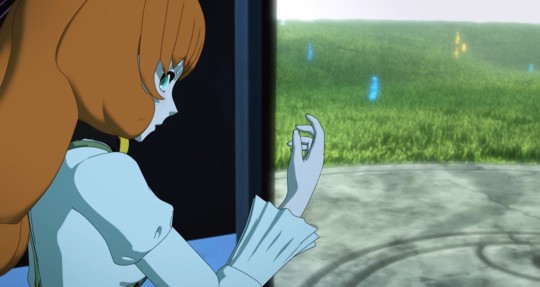
Happy Saturday, everyone! Oh man, oh man, oh man. I think I'll need to steer clear of the general RWBY tags this week, simply because I know the sort of responses I'll see to this episode. From smug celebration at Ironwood's downfall, to bad takes about what makes us human, this episode is a petri dish of sensitive material handled insensitively.
Let’s unpack it, shall we?
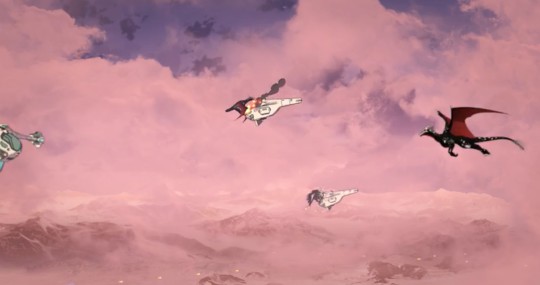
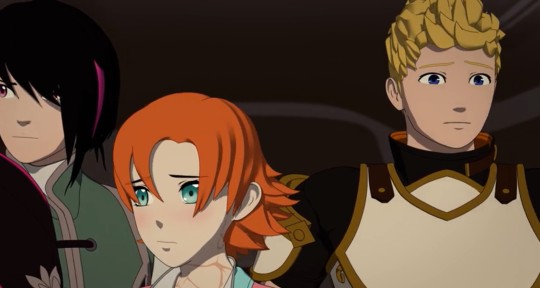
We open on an action that feels like a summery of the last three volumes: a grimm attacks an airship from the front, no doubt killing its pilot, while the other grimm conveniently ignore our heroes, no masking in sight. The group looks a little sad at the destruction around them, but ultimately ignore it because they have bigger, heroic things to do. I could write a whole, additional essay on how the huntsmen code — to protect the people — has been warped and abandoned by our protagonists in their effort to do what they think is right. It's a tale that might have been compelling if only RT knew they were writing it.
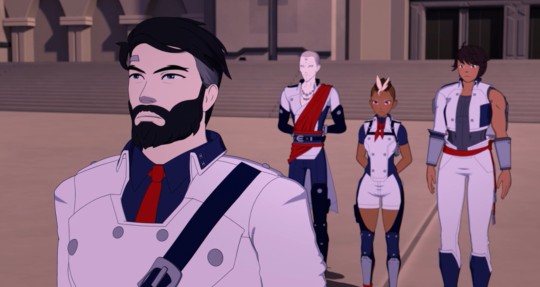
We get a shot of Atlas drones unloading the bomb before one is taken out, presumably by Qrow and Robyn. Segueing to Ironwood and the Ace Ops, they're waiting for Penny to arrive, the former carrying a massive gun presumably capable of capturing her. Despite the horror we saw on their faces last episode at the realization that Ironwood would kill Marrow for speaking up, it seems that now the Ace Ops are entirely in agreement with these measures. A week ago the implication was that they fell back in line out of fear, but now Harriet talks passionately about "putting down" the group if they were stupid enough to accompany Penny. "The General gave his terms." Vine sighs at this, but doesn't actively disagree. He's just "retracing the steps that led us here."
So, congratulations on introducing four new characters, not bothering to develop any of them, killing one off while ignoring Qrow's hand in that, and having the other three become all, "Yeah! Mass murder is a perfect solution!" off screen. Marrow is the only one with something resembling development and, as covered in these recaps, that's been pretty badly executed too.
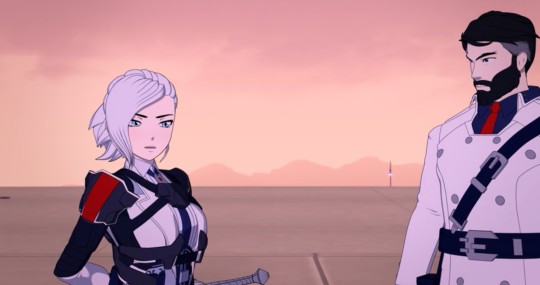
Ironwood sends them to deal with Robyn and Qrow after Winter reappears to "assist" him. That gets quotation marks because most viewers at this point have realized that she's who our two birbs spotted in the elevator. Winter isn't on Ironwood's side anymore, she's just skillfully clearing the field for the final attack. Indeed, we get a moment where she hesitantly brings up the bomb and Ironwood responds that he hopes she's not going to try and talk him out of it. No. Winter doesn't think that's possible. This was her final attempt at peace.
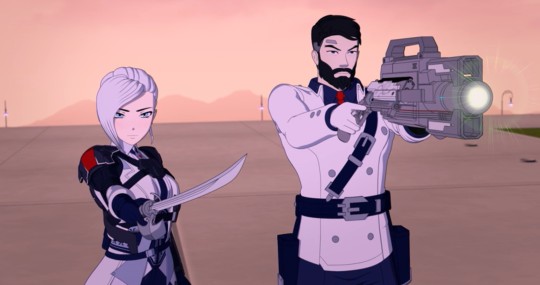
One of the reasons why I think I'll stick to my own blog for a while is because the fandom has a tendency to paint broad personality traits as evil when applied to some characters, yet simultaneously heroic when applied to others, when really it's about how that those traits are used. What I mean is, I've seen a lot of Ironwood critical posts that emphasize how stubborn he is. He thinks he's right and he won't back down. He wont listen to others. He's going through with this plan and if anyone tries to stop him? That's their mistake. Totally evil, right? Except, this is the exact same behavior Ruby displays, particularly in Volumes 6 and 7. She was stubborn about stealing from Argus and continuing the fight to the point where it endangered her and her teammates, to say nothing of the rest of the city. She refused to listen to Qrow, or Ironwood, or the Ace Ops, loudly announcing that she was right about, well, everything. If they didn't agree with her, the options were to leave the group entirely, or fight her. The actual difference here is that the writers have taken Ironwood to an extreme, one that's incredibly easy to understand as bad because it is bad: bombing Mantle has no defense. Ruby pulls the exact same nonsense, it's just not to that same extreme and her actions are followed by scenes that are meant to make us forgive her: a sad look because she didn't mean to get a city attacked by a leviathan grimm, a cry on the staircase because she didn't mean to risk the lives of an entire kingdom... even though she did. Ironwood is the bad guy because he's been written to take specific, OOC actions like shooting unarmed kids. He's not the bad guy because when other characters go, "Don't do this" his response is, "I have to." Because that's been Ruby's motto ever since she "had" to use the Lamp to rip Ozpin’s life story away. RWBY introduced those extreme actions of shooting the youngest in the group (for no reason) and threatening to bomb a city (for no reason) or shooting a councilman (for no reason) because when you remove those you've got a man who looks exactly like our hero. Ironwood's arc has been peppered with these confusing, unpersuasive actions because if you just keep the story as him stubbornly keeping to a plan he thinks will save the world, you're left with the reminder that all Ruby has done lately is stubbornly keep to plans she thinks will save the world. This moment with Winter just highlights how ill thought out Ironwood's descent has been because he does everything Ruby does... with a few, tacked on, “and randomly shoots people!” moments to ensure we understand that he’s definitely evil. No comparison to our heroes here, folks!
Ironwood is a bad guy now. That’s certain, but he was made that way so the story never had to grapple with the question of what that means for Ruby if we really start condemning things like lying, secrets, stubbornness, or endangering others for the greater good. Well then damn, if we strip away the hypocrisy then she might not be a good person after all. Or the people she’s simplistically labeled as bad might not be the devils Ruby claims they are.
But that’s a level of nuance RWBY would rather pretend doesn’t exist.
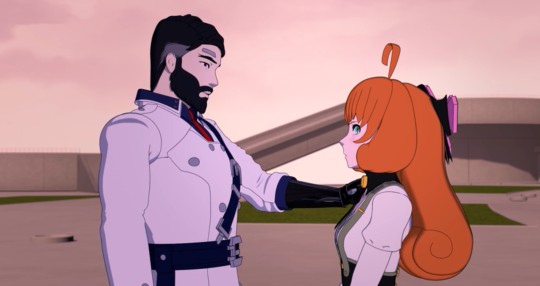
All of which is highlighted by Ironwood’s reaction to "Penny." He sighs and sags over the gun, immediately putting it aside. With his hand on her shoulder, Ironwood tells her she's "done the right thing." Precisely the same way Ruby would lower Crescent Rose and give someone a smile when they decided to fall in line with her.
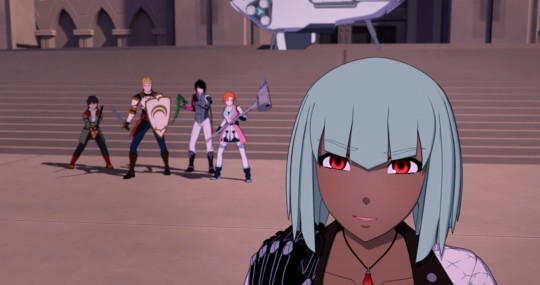
Which, of course, is the moment when Emerald reveals herself, dispelling the Penny illusion and revealing Team JNPR The Second behind her. She gives a quip about it feeling "weird" to do the right thing before disappearing.
From there the action picks up fast. I really enjoyed this battle simply from a choreography and energy standpoint. It gets the blood pumping, Ironwood's hand-to-hand is spectacular — especially that moment against Ren — and the group actually displays teamwork for the first time in what feels like forever, all of them needed to land a hit on Ironwood. As always, out of the context of the rest of the show it feels and looks great. My primary issue is that we get this fantastic fight against Ironwood. Not Salem, not Cinder, not Watts (like last volume when Ironwood was still a hero), not even Emerald as a means of transitioning from murderous villain to the group's best bud. No, what's arguably the best action sequence in the volume thus far goes to beating up the guy they betrayed from the start. There's no catharsis for me here, only frustration as we watch Ironwood stand in shock as Winter powers up Nora — who's fine now, I guess — and she slams her hammer into his face.
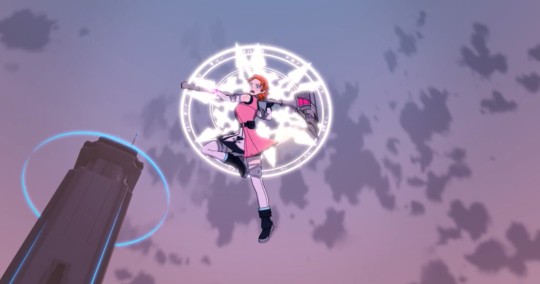
It never should have come to this and when a good character is done so dirty, their downfall doesn't evoke the emotions the writers are looking for. Watching Ironwood fall doesn't generate feelings of victory, or even tragedy at a course of events others were powerless to stop. It's just frustration at watching years worth of bad writing, sprinkled with fantastic ideas that never go anywhere.
Oscar gets a few hits in, Ironwood snatches his cane, and just as he's about to throw a punch, Winter arrives with the most dramatic sword slash I've ever seen.
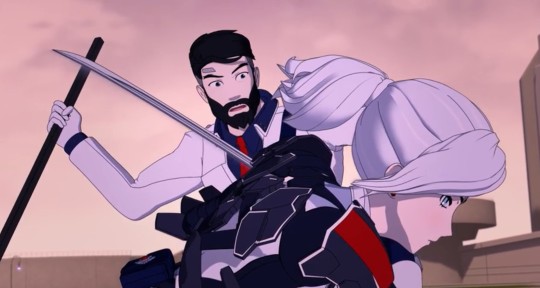

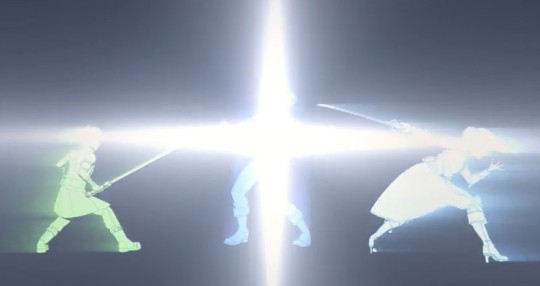
Ironwood's aura breaks and he falls, unconscious. We cut to an image of a droid's head separated from its body, one of Robyn's arrows through its skull. That doesn't have meaning or anything.

I suppose I should be grateful they didn't rip Ironwood's arm away during the fight, or outright kill him, though I'm still expecting him to die before the end of the volume.
Hmm. Wouldn't that be something? If after Salem's arrival, freezing cold, a Hound attack, grimm soup, a giant whale, a massive army, and a hack ending in self-destruction, the one character who actually dies is Ironwood.
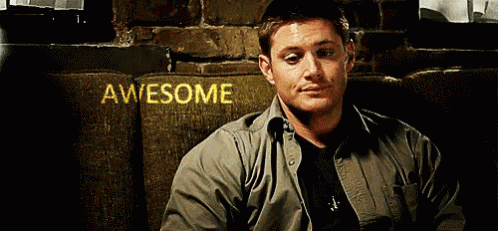
It's looking more and more likely.
Honestly, beyond all the obvious, what's so frustrating about this fight is that characters are only now using their impressive abilities to their fullest. Emerald creates an entire fantasy of what's happening and then straight up disappears, but she only does a half-assed version of that when fighting against Penny. (And really, she put more effort into helping the heroes she just joined over Cinder, the woman she's been obsessed with since the start?) Marrow refuses to use "Stay" against a group they wanted to peacefully arrest because that's just too horrible an act, I guess, but he'll do it on his own teammates the second Qrow and Robyn don’t want to fight.
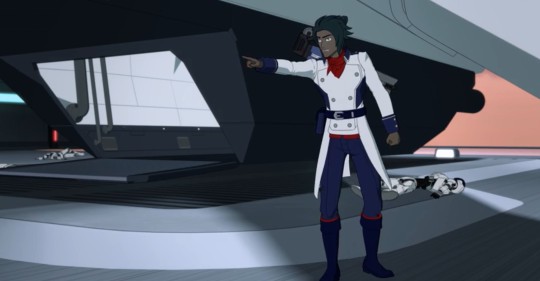
This is what I mean when I say the rules of the world bend to assist the protagonists in absurd ways. It's not nearly as egregious as Amity suddenly being up and running, but the fact that characters become substantially more powerful while fighting for the protagonists than they do against them is still a significant problem.
So Ironwood is down and out. As much as I hated watching that and didn't necessarily want more, am I the only one who felt like it was... a bit lackluster? I mean, the action was great, yes, but relatively short. There was no dialogue, such as another delve into the moral questions that led to this fight in the first place. There certainly wasn’t any hesitance against fighting a former ally. (Again, we’re meant to believe that the Ace Ops won because they just couldn’t bear to fight the group seriously, but every former ally here is capable of wailing on Ironwood without a single pause or pained look?) Ironwood just skillfully blocks for a while, is blindsided by Winter's betrayal, and then falls unconscious. Given that we learn he and Jacques will be evacuated after the rest of the kingdom, it's possible he'll escape somehow and we'll get a fight 2.0, but if not that feels like a rather tame end to the guy forced into the antagonist seat. Plus, what was the point of having Qrow frothing at the mouth to kill him this whole volume? I never wanted that to happen, I'm glad it hasn't, but I'm nevertheless left to ask why we bothered with that eleven episode side plot if we were going to erase it with one sentence from Robyn about Qrow being better than this. If that's all it took, let them work through Qrow's irrational anger while sitting around in a cell.
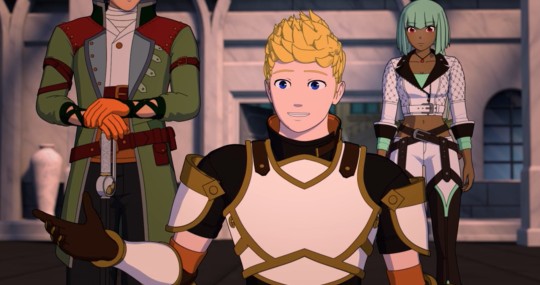
Winter tells the group to move onto "phase two" which is when we're treated to a flashback. We return to the ending of the last episode, with Ruby realizing that opening the vault is an option. Jaune, all smiles, goes, "We never considered using what's inside!"

This is what I mean about no consequences! This is what I mean about it all being a meaningless circle that ends with undeserved praise for the group! We started this horror show with Ironwood going, "We don't have a plan to protect the people, so I'm going to take what people we do have to safety" and the group going, "We don't have a plan either, but we're going to stop you implementing your plan because it's not perfect, risking a kingdom's worth of lives in the process." Now, the group has used two plans, one of which two characters knew about at the start and another they could have devised with the information they had. Oscar and Ozpin's, "We have an all powerful magical blast in our cane" and the group's "What if we used the Staff for something other than raising Atlas?" are both things that could have come up in the office debate. These were both always on the table! Instead, Ruby grew furious over the mere thought of cutting their losses, betrayed Ironwood again, attacked his people, denounced him to the world, and then two days later goes, "Oh wait! We could do something now that we could have easily done before if we hadn't made a needless enemy!"
Everyone realizes how much worse they made things, right? Turning against Ironwood, bringing everyone left in Mantle directly under Atlas, sitting around while an army was devoured, drawing it out until Penny was hacked... all of it would have been avoided if the group had thought and discussed things for a few minutes, not jumping straight to violently resisting what Ironwood came up with first. "We never considered..." Ruby says. Yeah, you didn't, except that's not something to smile about. The group made the situation a thousand times worse with their reaction when they could have just magically evacuated the kingdom from the start. “Maybe we could use it to save Penny and get everyone in Atlas and Mantle back to safety." Nothing has changed! They had this ability the whole time! Nothing about the last twelve episodes led them here, they just randomly thought of it after RT had padded the volume with needless drama. Considering that they're heading to Vacuo now, we could have just made this the finale of Volume 7 instead: big fight with Ironwood, revelation, get everyone evacuated while Salem attacks, leave her behind, then Volume 8 begins in Vacuo with the group knowing Salem is out there looking for them. This entire volume has been pointless. What did they accomplish?
Oscar got kidnapped and beat up, Nora was scarred, Ruby and Yang realized horrible things about Summer, and the whole world is panicking about a witch. Good things are... Ren and Ruby unlocked some semblance stuff? Weiss loves her brother again after he proved himself useful to her? Great work, team.
So this one moment makes everything they've done up to this point useless and, of course, once thought up the plan goes off without a hitch. Note that the summary of this episode says, "It's risky, dangerous, and nearly impossible — but it's the only plan they've got." Nearly impossible? That's a whole lot of talk for a plan that was implemented perfectly.
There is, admittedly, one snag, but one that is likewise made meaningless just seconds later. We'll get to that.
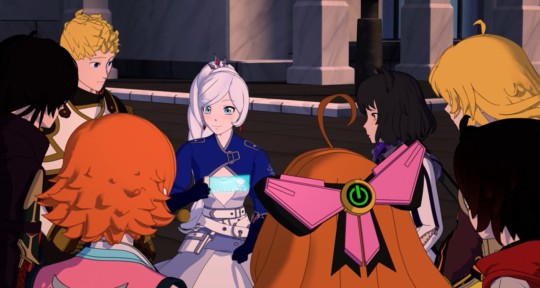
We see Winter call Weiss who also smiles at hearing from her sister. Obviously interactions like the group's with Emerald are the bigger concern, but it's still an issue that no one reacts as they should to people reappearing in their lives. Rather, RWBY continually confuses audience knowledge with character knowledge. We know Winter is on their side now, but Weiss hasn't a clue. Last she saw, she and Winter were agreeing to head down different paths. She has no reason to think her sister isn't loyal to Ironwood, so why isn't the group treating this call with suspicion? What if it's Ironwood trying to mess with them through a presumably safe party? I swear to god, with any consistency in the story this group would be dead ten times over because their decisions are so stupid. Oscar decides to believe in the guy currently beating him to a pulp, the group decides to trust a villain over a flawed ally, and now they see Ironwood’s second calling and are like, “Great, big sister Winter is checking in!” There’s a difference between a hopeful story filled with second chances and characters whose reliance on the narrative bending to assist them makes them come across as insanely naive.
None of which even touches on characters forgetting that other characters are presumably dead. Ironwood shot Oscar off the edge of Atlas, but doesn't react to learning he was kidnapped, or when he shows up to the fight. Thanks to Marrow's comment, Winter thinks YJOR have perished in the whale, but also has no reaction to them appearing to help with this plan. Absolutely nothing is followed up on.
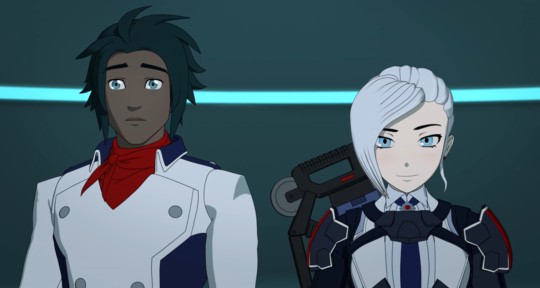
We then get a flashback within the flashback (fun) of Winter — shock — not arresting Marrow. It's precisely as I assumed, with Marrow angrily asking why she hit him and Winter responding with, “Because you were about to get killed if I didn’t do something!” As I said last recap, I feel like I should let the marginalized groups lead this discussion, but I do want to add that no matter how well intentioned — or strategic, as I mentioned last time — the imagery itself is still harmful. No matter the context, we were still left with white woman Winter putting her knee on black man Marrow's back to arrest him, and it’s an image that everyone in the U.S. should be familiar with the horror of. Far more of a problem than the (presumed) ignorance of this scene is, I think, the choice to make Winter entirely unrepentant. I think some of this discomfort could have been alleviated if RT had written Winter as apologetic, contrite that it came to that and asking Marrow to understand that she only did it as a means of assisting him. Asking his forgiveness. Instead, we get this
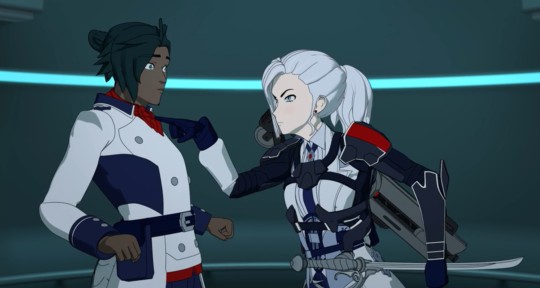
So what, the only emotion we have room for is gratitude that Winter beat him up? Yikes.
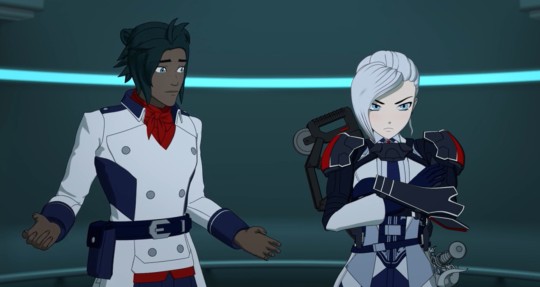
As a lighter side note, I find the animation here unintentionally hilarious. Winter's assistive device makes her shoulders look too high, making this gesture more, "Woman exaggeratedly pouts about not getting ice cream for dinner" and less, "Woman sternly closes off during a disagreement about saving lives and betraying their general." Gotta find our humor where we can, right?
What's intentional, but far less funny, is the needless animation to show us that, yes, Marrow is peering at Winter calling Weiss. Oh, the shenanigans.
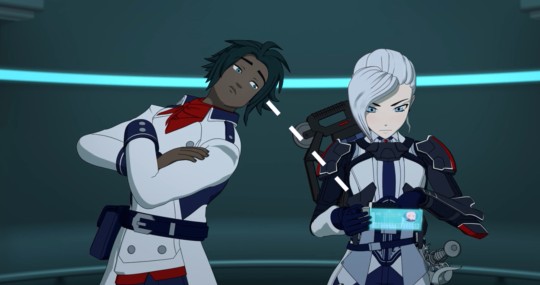

The elevator opens where Qrow and Robyn spot them. "Speaking of help," Winter says, as if she has any reason to believe Qrow didn't kill Clover. He and Robyn lower their weapons a bit, as if they have any reason to believe Winter and Marrow aren't still loyal to Ironwood. Would it really be so hard to have Winter immediately throw up her hands in the face of their almost-attack, blurting that she's not their enemy and needs their help, please listen? Again, RWBY can't remember which characters know what, let alone what their motivations and reactions should be.
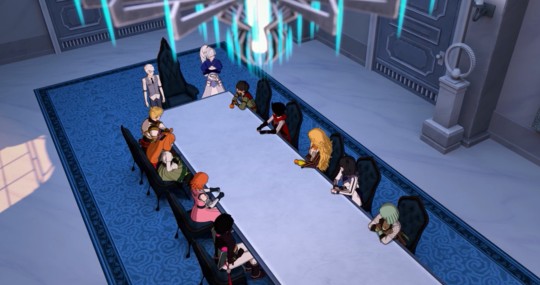
We then enter the third part of the flashback where everyone piles into the Schnee dining room and discusses doing the things they could have done from the start. I'm metaphorically banging my head against that table. In RWBY's favor though, we also get a long shot of Jaune continuing to boost Penny’s aura.
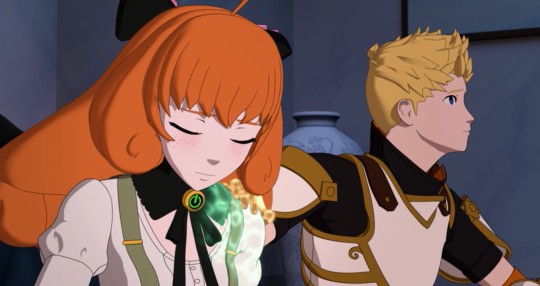
Though it's only one of many issues, just the other day I asked, "Hey, why has Jaune always needed to hold onto the person he's assisting, but now suddenly he can touch Penny once and the boost remains?" It still doesn't explain why he was letting go before/why him needing to boost her continuously didn't put a hard time limit on their plan — not that Mantle's hour limit meant a thing — but at least they're showing more of that here.
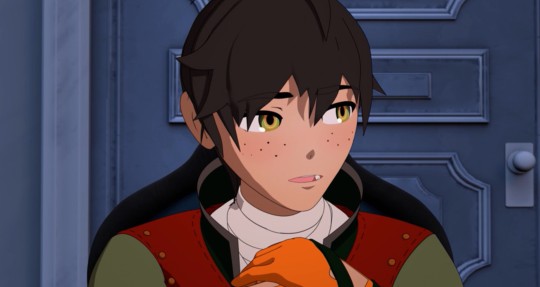
Oscar notes that Atlas has enough gravity dust that it won't fall immediately when they use the Relic, but they will have to move fast to ensure no one is underneath. Yeah, like all the civilians you put there. He also cautions that the Staff isn't a "magic wand" that they can just wave to make all their problems go away... even though that's precisely what they're going to do. Ozpin gets some lines that aren't apologies or followed by attacks — hallelujah! — about how the Staff's spirit is a "character" and requires that you be able to precisely explain anything you want him to make. Blueprints, examples, a firm knowledge of how this will be accomplished — all of it is required to actually get what you're after. That's a cool limitation. It's just too bad we didn't know about it episodes ago, forcing our heroes to find ways to meet those requirements. Instead, they already have everything ready to go the moment they learn about it: Penny has her own schematics and Whitley apparently has knowledge of the entire kingdom after sending some ships out. Normally I'd go, "Really?" but I'm still just struck by how much good he's done compared to everyone else in this room. Your show is seriously broken when the side character the writers didn't even want the audience to like until a few episodes ago is more active, mature, and sensible than the heroes.
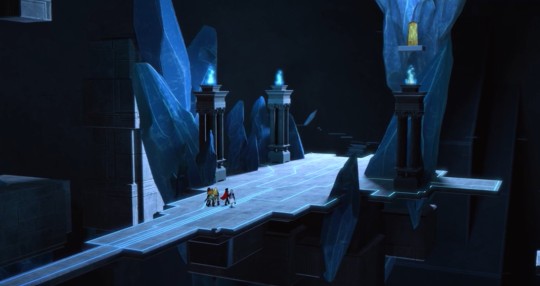
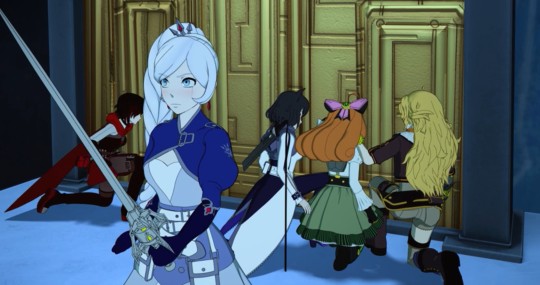
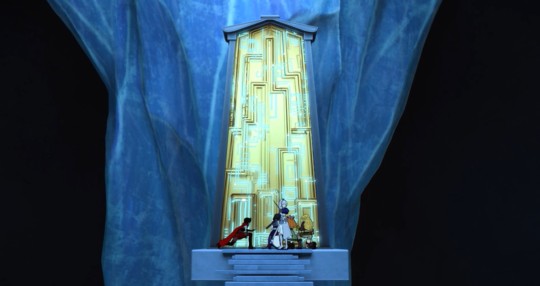
From there we see the group implementing the plan. They fly up through the hole Oscar left, straight to the vault. Penny opens it without any trouble and Ruby uses her speed to grab the Relic and stop time, halting her self-termination. I do like that combination of skill and their knowledge of how this magic works. That felt like a smart move. What's interesting though is that the Relic appears to stop time in the entire kingdom. We see people in Mantle and Atlas slowing to a halt too. I assume no one remembers that happening after time restarts, otherwise people would be freaked out by suddenly being frozen in place.
Wouldn't that have been cool though? The group often takes a while to use the Relics, either deciding what they need, or watching Jinn's information, so what if you had a population that blinks and suddenly, from their perspective, half an hour has passed? How long might Ozpin have sat on his knees after Jinn told him he wasn't able to defeat Salem? How long was that space frozen? We could have had a world built around rumors and fairy tales. Not the random stories Ozpin brings up to make a point and that we never hear about again, but tiny details that foreshadow these revelations. A Beacon where the kids tell each other spooky stories of people suddenly losing time, once a whole day. The wives, sisters, daughters, and nieces who disappear, or wake up one day with horrifying, unnatural powers. We see magic influence the world around it, but we've seen very little of the world reacting to that influence. The one time I can think of is Blake reading a book about "a man with two souls," the fiction clearly inspired by knowledge of Ozpin. And indeed, it felt great to recognize that as a significant detail and then be proven right years later as the lore was revealed. We could have gotten so much more of that if RWBY was better planned out.
I'm getting off track though. As time stops we see a series of images: Ironwood being led to a cell with Jacques, Penny succumbing to her hack, Team JNPR The Second preparing to contact the kingdom about what's going on. Then everyone is distracted by the giant, blue, buff Ambrosius who comes out of the Staff.
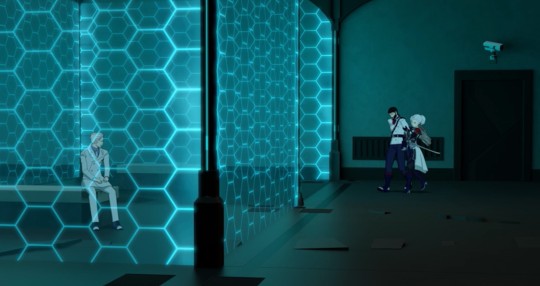
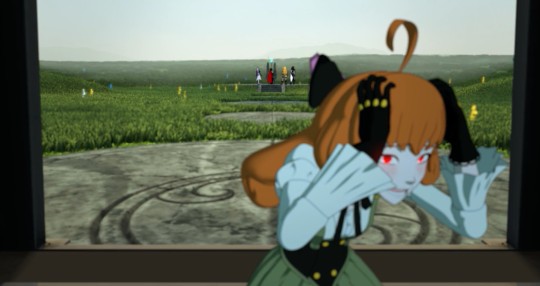
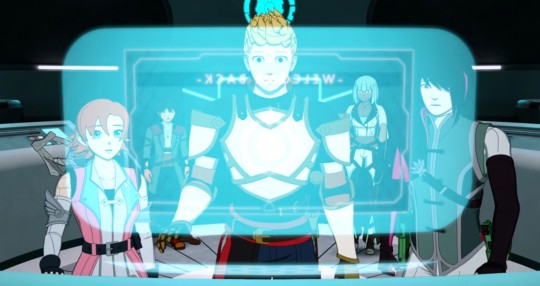
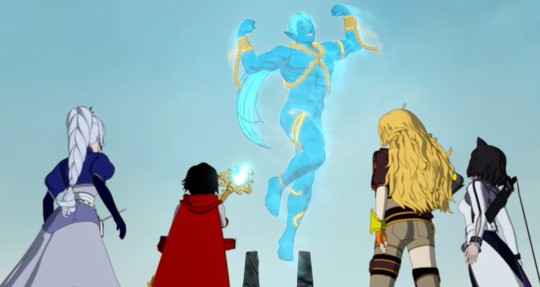
...there's a lot of innuendo in that last statement lol. At least RWBY is committed to the crazy design they chose? I was never particularly comfortable with the image of characters gaping up at a giant, naked woman in chains, so it's nice to balance that a bit with an equally giant, naked dude in chains.
From here things get confusing. In all honesty, I'm not sure if this is another moment where RWBY is trying to pass off a retcon as the group being brilliant, or if I, as an individual, simply didn't follow the logic. I won't bother to rehash the slow, meandering way that Ruby reveals their plan — that certainly didn't help with the clarity. Not in an episode where we didn’t even know these rules ahead of time — but it boils down to this:
The moment they have Ambrosius create something new Atlas will start to fall. Two of his creations can't exist at the same time.
He needs clear instructions about what he's making in order to create it.
The group has brought him Penny's schematics so that he understands how she's built.
They want, specifically, "a new version of her... using her exact robot parts."
They can't just create an exact duplicate of Penny because that would carry the virus with it.
They can't create an exact duplicate without the virus because that Penny would cease to exist as soon as they used Ambrosius to make an evacuation plan instead.
So they essentially want Ambrosius to create a new Penny by removing all the robot parts from the Penny that currently exists, carrying the virus with them, and leaving only the human parts of Penny behind: her aura/soul. Then, the purely robot version is destroyed when Ambrosius creates something new.
Except... this new Penny, this human Penny, still needed a human body. That's what Ambrosius created and that's the snag I don't understand. They want a version of Penny that's just her aura, just her soul, but that soul still needs something to be housed in. Ambrosius himself notes that. At first I thought the group would just have some wisp-like version of Penny they'd have to find a new body for — perhaps leading to a new one for Ozpin too — but she's just... given a human body when he takes the technology away, something she absolutely didn't have before. That is Ambrosius' creation. That is what should have disappeared along with the removed parts of Penny, leaving only her soul — what Ambrosius didn't touch — behind. Instead, the plot oh so conveniently has Penny get a new body for free and it's untouched as they move onto the next task.
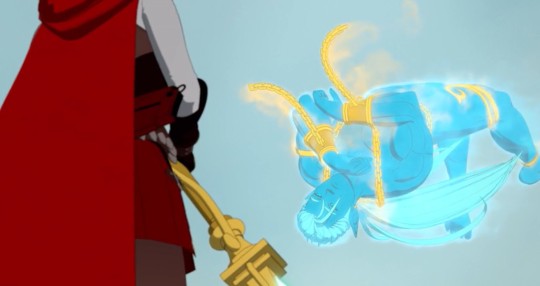
Ruby drops a casual line about Ambrosius not being able to kill, or destroy, or something, which I think is meant to be the justification here. The rule (which, again, we JUST learned) about not killing anyone supersedes the rule of two creations not allowed to exist, allowing Penny to stick around. But even if that’s true, it’s a load of bull. What, does the magic think no one in an entire city might die if the floating mechanism is removed and it plummets to the ground? Ambrosius didn’t say, “Sorry, can’t stop floating Atlas because thousands of people are still here and they’ll die if I create something new,” but we’re supposed to believe the group skated by on, “Sorry, can’t destroy the last creation like everything else because there’s a single person still using that body and she’ll die if I create something new”?
Seriously, did I miss something? Or is this another, "Amity is ready because the group needs it" situation? The rule of creations ceasing to exist is bent because the group needs to have their friend around. Ambrosius is certainly enthusiastically complimentary, saying how "smart" the group is and that they've "done their homework," but I'm not so sure. It feels like a moment where the show is (once again) insistent that the group is far more talented and brilliant than their actions actually imply. It's only the rules of the world twisting and turning that allows for their success. To say nothing of how the episode dropped all these rules on the viewer in a ten minute info dump, ensuring we didn’t have any time to think about them before the deed was done.
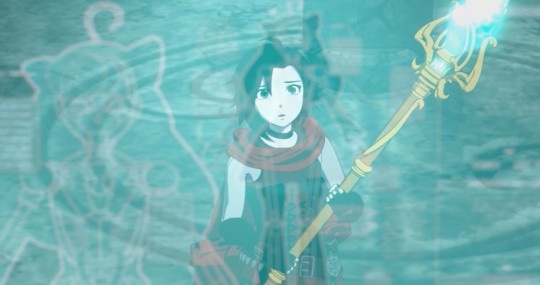
It doesn't add up for me and honestly, even putting that aside? I hate this. I absolutely despise it. Look, if it turns out this really does make sense then props to the group for coming up with that plan. Our snag aside, the rest is a legitimately well thought out wish. I don't have a problem with the execution so much as the message. I've been saying since Volume 7 that RWBY has done Penny a disservice in terms of her "real girl" narrative. Whereas before we had a firm message that you don't need "squishy guts" to be human, to be real, Volume 8 continued to carry us further and further into the idea that it is necessary. That Penny's body is entirely inhuman, something to hate, but at least her soul is human and good. That's what the virus arc taught us: your terrible, technological body might be betraying you, but hold onto the parts of you that are really human. I hated that too, but I never thought RWBY would go this far. They made Penny fully human and went, “THIS is the version that always should have existed.”
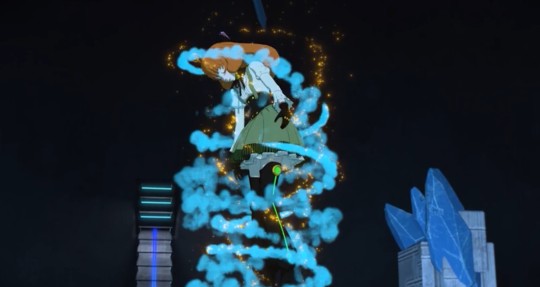
And this isn't just me reading into the implications. It's right there in the text. Blake says that they're looking for “Penny, the girl who’s always been there underneath." Meaning, underneath the metal. The girl exists trapped in the robot body. Yang holds up her arm and says that the metal is only "extra," it's not really who you are.
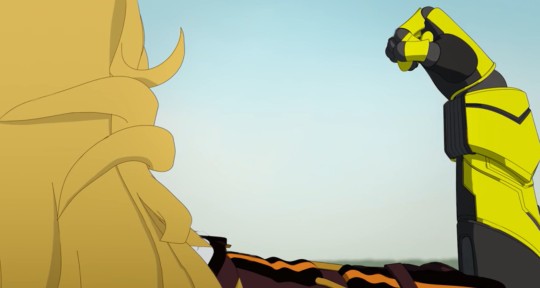
That gets into two perspectives on disability that RWBY just doesn't have the nuance for: what's an integral and celebratory part of one person's existence can be seen as something separate and discomforting to another. Though there are many people with disabilities who would happily cure themselves with a magic Staff if given the chance, there are just as many who say no, this is a part of my identity. I don't want to change, I just want the world to accommodate my existence. However, RWBY takes a hard stance here, saying that any metal in your body is intrinsically bad. We didn’t use to have this take, but now the show has embraced it. Blake says the real Penny is trapped in there. Yang's words implies that she'd get rid of this "extra" bit of her if possible. Mercury with his metal legs is the enemy. Ironwood with half his metal body is the enemy. Whereas once difference was truly accepted, now it's shunned and fixed whenever possible. Those who can't be fixed, like Yang, must simply deal with the lot they've been dealt, reassuring themselves that the metal isn't really them. But Penny? Penny they can fix.
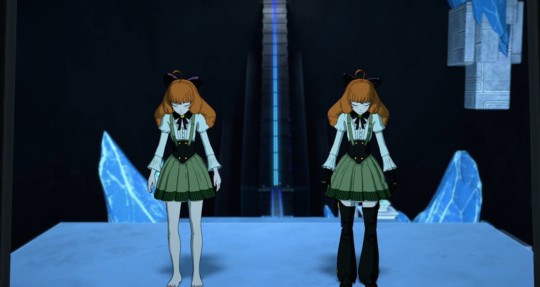
So they do and the very first thing Penny does is hug Ruby, exclaiming, “Do hugs always make you feel this warm inside? Wow. More!” and proceeds to hug all the others.
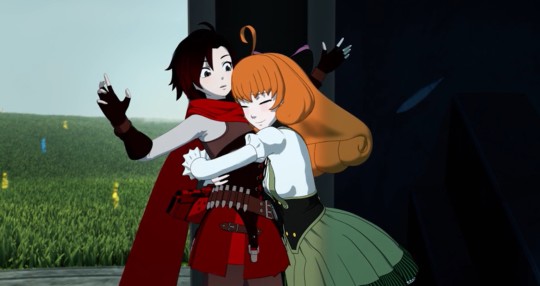
What's the underlying message there? Penny didn't understand hugs before this moment. She never experienced the "warmth" of them while an android, despite the fact that here warmth is entirely metaphorical and has nothing to do with a literally cold body. RWBY really went and said that the "real girl” android was never actually real at all — not as real as she could be — because it's only when she's given "squishy guts" that she understands the true happiness of a hug.
Wow.
I mean seriously, wow.
Never-mind that, you know, we've seen that happiness and warmth since she was first introduced.

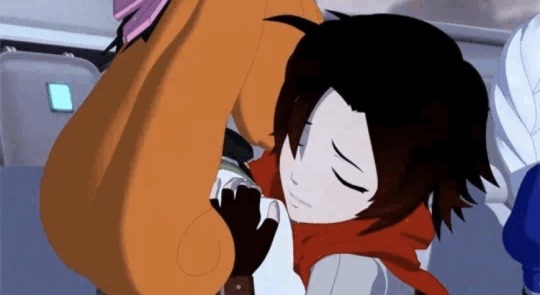
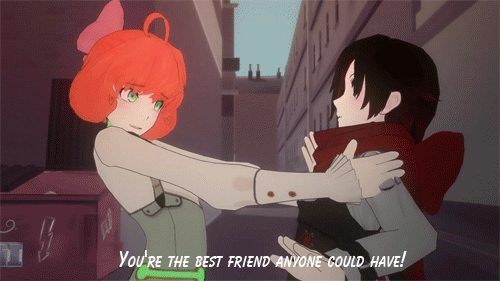
RWBY is really rewriting all the core themes introduced in Volumes 1-3 and it sucks. The show is absolutely the worse for it.
To say nothing of all the other disservices to Penny's character here. There's all this buildup about whether she'll still be the same Penny once the wish is complete, but of course she is. We wouldn't want to have Penny struggle when she becomes something other than what she's always been, would we? After all, it took Yang an entire volume to work through the shock of a metal arm, but taking away a metal body for a human one is in no way traumatic. Having a normal, human body is intrinsically a good thing! Of course Penny accepts it with nothing but smiles. Becoming human is celebratory, but becoming more machine is a horror.
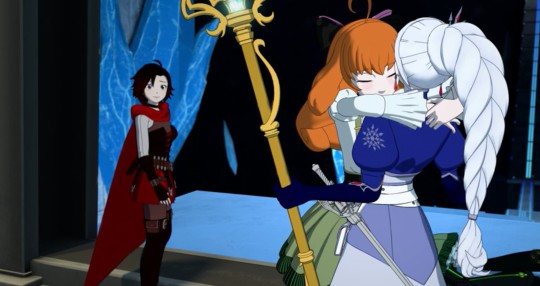
She gets to watch her body self-destruct, glitching out and collapsing in front of her. But again, nothing to unpack there that can't be covered with a hand over her mouth.
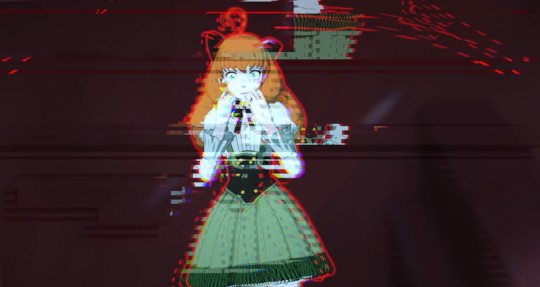
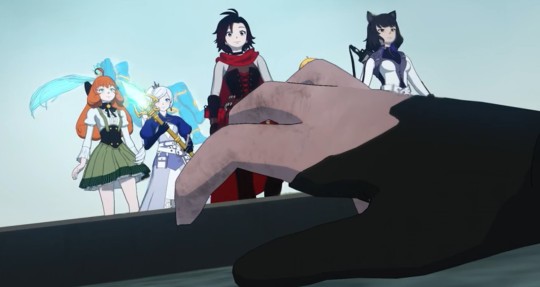
There's no discussion of whether Penny still has the Maiden powers, or whether a wish like that would mess with the transfer in any way. How did the group know this action wouldn't register as a clear-cut death, forcing the power out of her and into someone new? Obviously they couldn’t know, but no one even thought to bring it up?
And the entire time they're formulating their evacuation plan, there's no talk of whether these portals will appear before everyone currently alive in the kingdom. I mean, if they do then Ironwood and Jacques can just waltz through and escape into Vacuo. If they don’t, then Maria and Pietro don't necessarily have a way out. We still don't know if they're stuck floating in Amity, or if Amity crashed, or if they made their way back to Mantle or Atlas. More importantly, the characters don't know. I have no problem with RWBY keeping that a surprise until the finale, but I absolutely take issue with Pietro's daughter walking through a portal, seemingly not to care whether her father is going to make it out too.
It's been the same with Qrow and his nieces' relationships. The show is good at insisting that these families love each other because they hug and smile while on screen together, but when shit is actually going down, none of them care about pesky things like disappearances, arrests, or “The last time I saw you, you were with an old woman on a damaged station after a villain attack, potentially stranded in deadly cold if life support failed.”
So yeah, this entire arc with Penny has been a disaster. From throwing away her framing subplot, to giving her a virus that did absolutely nothing, to giving her the Maiden powers which she's also done nothing with, to erasing her android status for a “She's really human now” message, Penny has been done dirty by the show these last two volumes. Not nearly to the extent Ironwood has, but still. At this point I wish they'd just kept her dead dead. Why do I want her back when that resurrection produces no reaction, her conflicts lead nowhere, and one of the core things that made Penny Penny has now been magically erased?
I've been saying for weeks that killing Penny off and keeping Penny around each had serious downsides attached, yet I never expected RWBY to do BOTH.
Also, I'm warding off any, "But Pinocchio was made into a real boy too" defenses. RWBY is not Pinocchio. Penny is not Pinocchio. I thought the allusion was going to be the Pinocchio inspired girl heading into the whale, not the show forcing the exact plotline — down to a blue, magical creature — onto a character whose entire journey has been about accepting herself as an android. Congratulations, RT. You just obliterated years of work.
Again, if you'd like an example of how to do this far better:
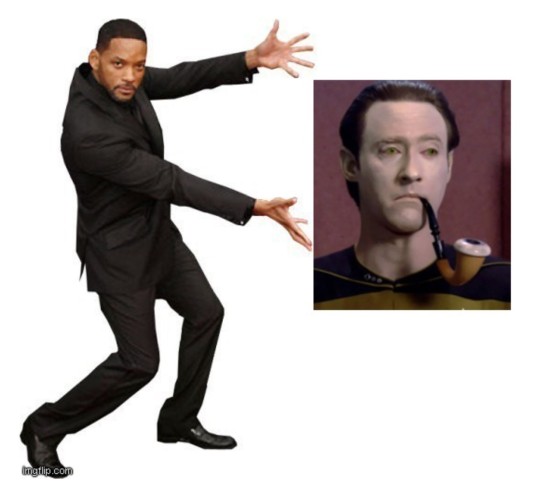
As Penny's character falls apart, Atlas shakes, alerting Jaune and the other that a new wish has been granted. Jaune pecks at the screen and realizes "That did, uh, something…?” but doesn’t realize that there's a giant, red "LIVE" up in the corner.
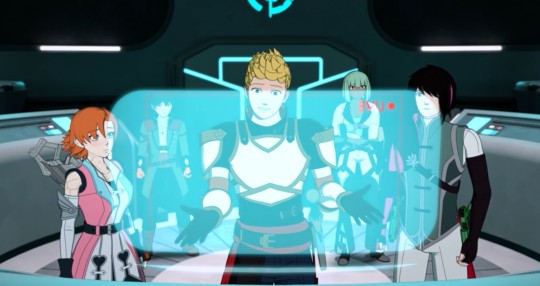
Jaune tries to warn the entire kingdom about their plan, but what he actually says is
“Atlas is falling, but — !”
And then the communications cut out.
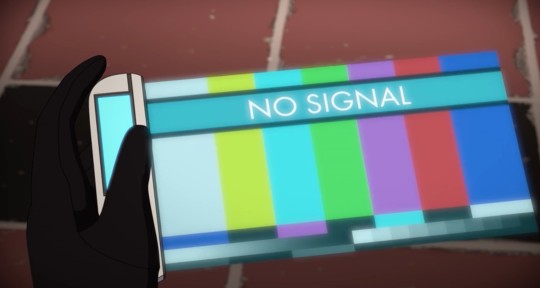
Watts, perhaps?
Our heroes are really good at saying things that make large populaces panic, huh? This is the one (1) snag in their "impossible" plan, but as said above, it doesn't amount to anything. We get a shot of Nora, horrified at the thought of kingdom-wide communications being down, but literally seconds later Team RWBY has made portals appear that everyone can walk through. So... why do we care about communications? More importantly, why does the show try to make us care? So much time is spent getting the viewer invested in problems that never come to mean anything.
Including the problem of Salem herself.
Because the group successfully creates that evacuation plan. This is it. Everyone is leaving while Salem still reforms.
Yang asks if they can use the vaults themselves as a single point for everyone to go to and Ambrosius agrees. So everyone is going to pile into the Vacuo vault that can only be opened by an unknown Maiden? They're going to put an entire kingdom's worth of people, including their enemies, into the vault where the Relic of Destruction is? Yeah, that's great. Prior to this — like if this had been the plan at the end of Volume 7 — I would have 100% agreed that these risks are better than death by Salem/grimm/cold. Now though, Oscar as axed Salem for an unknown length of time, the cold is having no impact on the civilians outside, and the grimm only attack background military personnel that supposedly no one cares about. They couldn't have spent another few minutes (especially with time stopped!) to figure out a means of getting to Vacuo that doesn't involve revealing and providing access to the location of a super secret vault? To say nothing of what they're going to do if Salem wakes up and snags one of those portals for herself. Two kingdoms for the price of one!
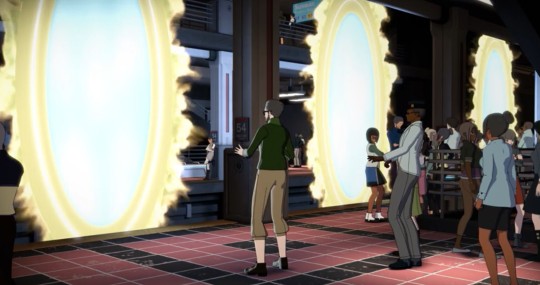
But that's what they're going with. Weiss gives Ambrosius a schematic of the kingdom, I guess, and he makes branching pathways appear with numerous portals for everyone to step through. They'll enter through one and, when they exit another, will be in Vacuo. Easy peasy, right? Especially since Ambrosius doesn't seem to have any limitations about how often his power is used. Is it three creations every 100 years like Jinn? We're not told, at least not to my recollection. However, I was expecting there to be a waiting period, that they'd fix Penny, go to evacuate the kingdom, and learn that sorry, I can't make another creation just yet. It feels like the sort of shit move these beings would pull — "Don't cry to me when it's not what you wanted" — it would have been another commentary on the group's insistence on putting friends over the people's safety (like demanding the Ace Ops not bomb the whale because of Oscar), and crucially, would have kept the action in Atlas. Isn't that what this volume is? The battle for and potential destruction of the Kingdom of Atlas? We have two episodes left and, unless something unexpected happens, we're moving that action to Vacuo. Why?
Meanwhile, Penny's corpse is just chilling in the background 😬
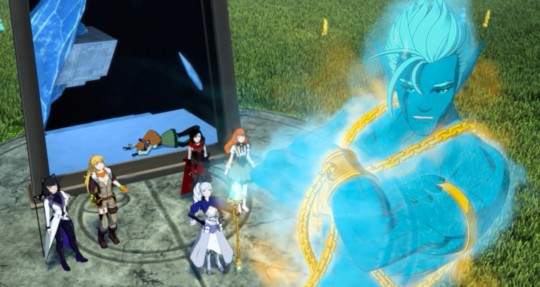
While all this is going on, Winter reassures Jacques that he and Ironwood will be evacuated too, though she makes it clear saving him was Weiss' idea. It checks out, considering Weiss is the one who turned her father's arrest into a joke last volume. Winter still takes his abuse seriously.
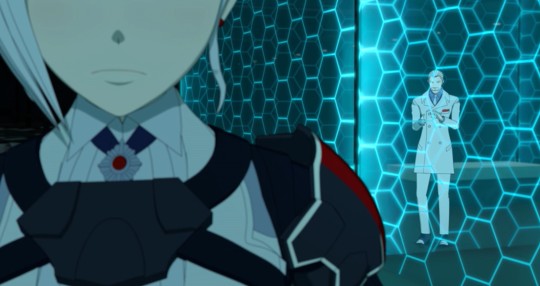
The group prepares to leave with a celebratory, "We did it!" from Weiss. I'm still banging my head against that dining room table. Before they can pass through the portal though, Ambrosius leaves them with one, dire warning: "Do not fall."
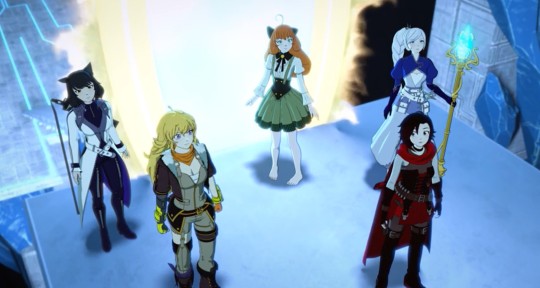
In any other story a line like that is a neon sign announcing to the audience that someone will absolutely fall, and maybe they will, but RWBY has dodged consequences so often I wouldn't be surprised if this was merely another way to string us along. Remember all the hype surrounding Salem? The cold combined with her army and magic? How she was going to decimate Atlas and leave our group broken in a Fall 2.0?

I mean, we still have two episodes left. Forty minutes of content. Salem might still decimate them, especially since something has to happen in the finale. But god, it's a problem that we've come this far without a payoff. Salem randomly decided not to attack anyone, was stopped by a weapon added in solely for this purpose, and now the whole kingdom is being evacuated with a plan the group could have used at the start. This volume really is meaningless.
“We go to vacuo and hope we’ve thought of everything” they say as the camera zooms in on Cinder's smiling face. For the second week in a row.

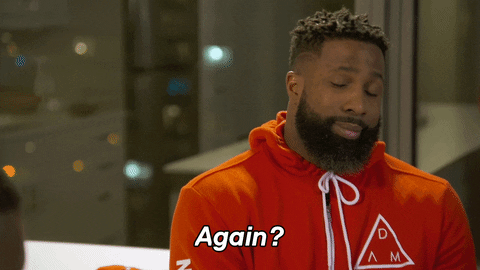
Bingo time!
Winter betrayed Ironwood, the group used the Staff of Creation, and I'm axing Maria on behalf of Pietro. You can't have the guy's daughter become human — after he was killing himself to give her his aura?? — and magically walk to Vacuo, not knowing if he's even survived since she last saw him, and expect me to think he hasn't been forgotten. Same with Maria. Has the group mentioned her since Amity cut out, notably for reasons they couldn’t explain? Of course not. Did they care to find out what happened? Of course not. I have no doubt they'll both re-appear in the next two episodes, Pietro crying over how perfect his girl is now and Maria congratulating the group on their actions, but we're still marking it.
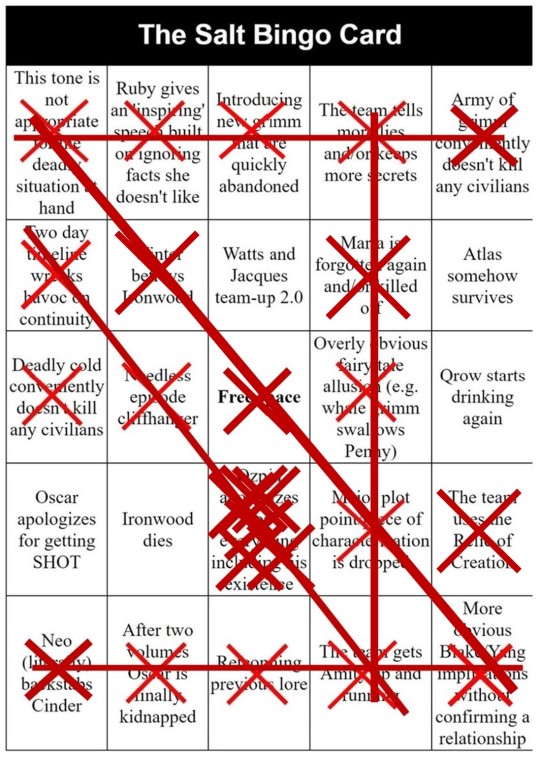
This is the ugliest thing I’ve ever created, I hope you all are enjoying it :D
Another week, another couple feet added to the hole we’re digging. I know I keep saying I have no idea what's going to happen next... but I have no idea what's going to happen next. A Vacuo ending was not in the cards, not outside of them miraculously showing up in ships. Maybe they have been on their way to Atlas (somehow...) and will arrive precisely when everyone has left! Anything is possible at this point.
See you next Saturday, everyone. Hold on until then lol. 💜
92 notes
·
View notes
Text
Ahistorical, Absurd, and Unsustainable (Introduction and Part One)
An Examination of the Mass Arrest of the Paranormal Liberation Front
INTRODUCTION
The title states my premise here: the breezy way My Hero Academia presents and resolves the mass arrest of the Paranormal Liberation Front is ludicrous. If taken as presented and allowed to stand without being further addressed, it serves as a breaking point from which the series will be incredibly hard-pressed to recover. Why, you ask?
From a logistical standpoint, it strains credulity. From an ethical standpoint, it suggests deeply troubling problems with the state of Hero Society. From a thematic standpoint, it unravels whole portions of the narrative’s spine. I’ll be looking at each of these facets in turn to discuss the questions they raise which My Hero Academia has not yet seen fit to answer. Many in fandom don’t seem to be thinking about it too hard, so I’d like to lay out—in exhaustive detail—all the reasons I find this plot element so wildly out of touch with causal reality.
Please note that while they are discussed when relevant, this essay is not principally about the named characters in the League of Villains or the erstwhile high command of the Metahuman Liberation Army. The sorts of consequences Shigaraki Tomura or Re-Destro would and should be facing in a courtroom are orders of magnitude beyond what Random Liberation Warrior X would be, but it’s the mass numbers of Random Liberation Warrior Xs that this essay is most concerned with, as they are the ones most in danger of being swept under a rug and forgotten by the series in its current state.
Further, be advised that this essay in its full form is both very long (about 21K words excluding Sources and Further Reading) and will contain extensive discussion of real-life Japan—comparisons to historical events, minutiae of its legal and carceral systems, and general cultural views on criminality. This will include references to imprisonment, government oppression, and incidents of terrorism both real and in the context of My Hero Academia.
Being as it is about quite a recent event in the series, it will also contain heavy spoilers all the way up through the most recent chapter as of this writing, Chapter 310. It likewise contains spoilers for the spin-off series My Hero Academia: Vigilantes up through Chapter 95.
The essay will be posted in parts on tumblr and in full on AO3. For the tumblr posting, I will provide links to other tumblr posts as I reference them; however, as I would like this to actually show up in the tags, outside links containing my sources and further reading will be provided in a separate post following the conclusion of the essay.
Lastly, I spent an entire month writing this as a fan who is sympathetic to the villains in general and the MLA in particular. If your response to the very concept of this essay is anything to the tune of, “Who cares what happens to a bunch of disgusting quirk eugenicists?” know that you and I have radically different views on the MLA, and the role of the justice system in general. You are, of course, welcome to read the essay anyway, but, having said my piece about the MLA and their relationship with quirk supremacy elsewhere, I will not be engaging with arguments or gotchas on that subject here.
PART ONE: The Facts at Hand
Before we get too deep into things, let’s lay out the basic facts: how many people are actually involved in the arrest, as well as some comparisons to real-life events to contextualize that number and provide some referents for the issues the arrest raises.
Re-Destro gives the numbers of the Metahuman Liberation Army as 116,516. A lot of people go on to die in Deika, though we’re never given a solid count. The biggest batch we see killed in a single go are the press of sixty or so people Shigaraki decays, then the sixteen-ish Toga drops, though some of those might possibly have had quirks that allowed them to survive. Any number of people certainly died as well simply in the moments we didn’t see, and who even knows how many were caught in the radius of Shigaraki’s last attack.
Further, there may well have been a measure of organization bleed when the MLA became the PLF (though I imagine trying to leave was a very dangerous proposition, giving an additional reason to stick it out on top of the general cult-like mindset the MLA displays); likewise, I find it hard to believe that there wouldn’t have been some deaths at the Gunga Villa, be it from Gigantomachia’s departure, Geten cutting loose, or combatants—be they hero or comrade—overcompensating somewhat in the middle of a chaotic melee.
I suspect it’s overestimating the depletion, but for the purposes of simplicity, let us call it 115,000 remaining members at the time of the raid.[1]
We are told that, in all, 16,929 people were captured at the villa—just about 17,000. 132 escaped in the confusion; this is a fairly negligible number, save for the fact that it includes high-ranking advisors, but not Machia and those of the Front that were with him.
We are further told, and I quote, “Their bases scattered around the country were hit too, and the sympathizers rounded up.” Horikoshi did not provide any solid numbers for this,[2] but if we’re to assume that it is just the rest of the group (more on the logistics of that bit of spycraft later), “the sympathizers” would be 98,000 additional people.
However, 98,000 may be a significant underestimation. It’s based, after all, on a number Re-Destro cites to describe “warriors lying in wait, ready to rise to action.” This begs the question: is Re-Destro quoting the entire membership of the group, or only those who actually are ready to take action? In other words, does his number account for non-combatants? Is he counting young children? I tend to assume the MLA doesn't have a retirement age as such,[3] but if they do, does his number account for the elderly?
How many more people might be “sympathizers” to the PLF insomuch as they are e.g. the six-month-old infant daughter of an MLA couple? What about the ninety-year-old man in the retirement home whose only real act of war these days is tying up the phone line at City Hall to complain about repressive quirk use laws? How about the fired-up fifteen-year-old that was going to get their official code name next month, just in time to join the first wave of attacks? If he’s being literal in his usage of “warrior,” the actual count of the MLA could easily be twice as high as the number he actually gives.
But okay, maybe Re-Destro’s number does include absolutely everyone. Maybe he’s just being rhetorical—maybe, in his mind, even the six-month-old is waiting to rise to action; she’s just going to have to wait a bit longer than the rest, is all. For simplicity’s sake, let’s stick with the numbers we have: a low-end of 17,000, a high-end of 115,000, captured not merely in a single day, but allegedly in the span of a few hours.
I’m sure I don’t need to stress that that is a lot of people. But how many people is it, practically speaking? Is there a precedent? Anything we can look to for guidance on how this kind of thing would go in real life?
Comparative Analogues
The PLF is tricky to categorize for the purposes of real-life comparison, especially compared to how they’re treated in-universe. In some lights, they resemble a protest movement; in others, a terrorist group. Just looking at the way the government reacts to them—and certainly in terms of their combat capabilities—they might as well be an all-out insurrectionist uprising! Below, I’ll examine a handful of historical incidents that cover that spectrum; they will continue to provide useful reference points throughout the rest of this essay.
The March 15 Incident
In the first half of the 20th century, Japan saw a huge uptick in socialist and communist activity, much to the general dismay of the ruling powers. In response, they passed a series of laws commonly referred to as the Peace Preservation Laws, designed to better enable authorities to suppress political dissent and freedom of speech, particularly that of leftists and labor movements.
The Japanese Communist Party was founded in 1922, but outlawed in 1925. This merely drove members underground, however, from which position they pointed supporters towards the numerous other parties with more legally tolerated leftist policies that had cropped up in the wake of the JCP’s dissolution. Following the February 1928 General Election (the first in Japan held with universal male suffrage), those parties supported by the JCP saw enormous gains in representation in Japan’s National Diet. Alarmed, the Prime Minister declared the mass arrest of known communists and suspected communist sympathizers. Accordingly, on March 15, 1,600 people were arrested throughout Japan.
Over the course of twenty years, some 70,000 people would be arrested under the auspices of the Peace Preservation Laws, the majority of them in 1925 through 1936. The laws would eventually be repealed by American occupation forces after WWII, and the JCP allowed to operate openly once again.
The Rice Riots
In 1918, an inflation spiral had driven the price of rice out of control, exacerbating economic insecurity and hardship. Farmers were being paid a pittance of the market value of their crop by rice buyers and government agents, while urban consumers were being charged an exorbitant price for the staple food, as well as a great many other consumer goods, and their own rents. In response, a series of riots ripped across Japan in late July through September. Beginning with peaceful protesting in a small fishing town in Toyama Prefecture, the unrest escalated to involve riots, strikes, looting, even bombing in demonstrations that reached major cities like Tokyo and Osaka. The scope was and remains unprecedented in modern Japanese history, seeing some 25,000 people arrested.
The Sarin Gas Attacks
If you’ve heard of any of them, it’s probably this one. On March 20, 1995, members of the cult Aum Shinrikyo released sarin gas on five different Tokyo Metro trains in the middle of morning rush hour. Thirteen people were killed and over 5500 injured, about a fifth of them moderately to severely so. If not for small errors in the production of the gas and the rudimentary distribution method thereof, loss of life might easily have been catastrophically higher.
Aum Shinrikyo was a doomsday cult, but the motives for that particular attack were much baser than bringing about the Apocalypse: at the time, the organization was under police investigation for its involvement in the kidnapping of a public official. Its leader, Asahara Shoukou, hoped that the attack would divert police’s attention from a planned raid.
It did not do so; police executed raids on numerous of the cult’s compounds, arresting many of its senior members both immediately and over the course of the following months as the investigation unfolded. In all, over 200 members were arrested of an organization that counted its membership prior to the attack as numbering 11,000 people in Japan.[4]
The February 26 Incident
There have been a significant number of uprisings and violent protests in Japan’s modern history; when looking for a representative example, I focused my attention on the military coups of the 1930s and 40s, largely because they took place in what was closest to the modern Japanese legal context.[5] Of that subset, I chose the February 26 Incident for the severity of the government response. The others disintegrated before they could be properly carried out or were met with sympathy for the dissidents despite the obvious illegality of their actions. The February 26 Incident, however, was when they finally became too troublesome to dismiss, and the Emperor himself ran out of patience.
In this period, the Japanese military had become drastically factionalized into two main groups—an ultra-nationalist group, largely powered by a group of young officers, which supported the Emperor and wanted to purge Japan of Western influences, and a more moderate group mainly defined by their opposition to the above faction.[6] Occurring in 1936, the February 26 Incident involved the young officers, believing that they had tacit approval from higher-ranked officers of their own faction, launching assassination attempts against the nationalists’ most prominent enemies in the government (six assorted Ministers and former Ministers in the Emperor’s Privy Council and the Diet) and a bid to seize control of the administrative center of the capital and the Imperial Palace, after which they planned to demand the dismissal of more officers and the selection of a new Cabinet.
The seven ringleaders had convinced eighteen other officers to lend their forces to the attempted coup, a total of around 1,500 men, calling themselves the Righteous Army. Several of their assassination attempts failed, however, and while they succeeded at taking the Prime Minister’s residence and the Ministry of War, they did not manage to secure the Palace. The outraged Cabinet demanded the Emperor take a hard line with the rebels, and by the 29th, the Righteous Army was surrounded by 20,000 government troops and 22 tanks. In this hopeless situation, the officers dismissed their troops; two committed suicide (a third attempted it unsuccessfully) and the remainder were arrested by military police.
International Examples
For obvious reasons, I prefer to limit my examples to events that happened in Japan. However, I will also be briefly referring to a few international incidents of mass arrest, taking place in India, the U.S., and Egypt, respectively.
In the following parts, I'll use these facts and comparative analogues to take a closer look at what readers were told became of the Paranormal Liberation Front.
Part Two
-----------------------------------------------------
Footnotes (Part One)—
[1] Over three months’ time, they likely gained some new blood also, simply in the course of their usual recruitment tactics. You don’t get an underground organization that size by sitting back and waiting for people to come to you, after all. I don’t know a practical way to calculate that, though, so just bear it in mind for when I talk about new members later.
[2] Possibly because he was aware that 17,000 people captured in one fell swoop was difficult enough to swallow without adding on more than five times that number.
[3] We do, after all, see some very aged people fighting in the streets of Deika.
[4] They were considerably more international than you may have heard. They had 50,000 members at the time, some 30,000 of them based in Russia.
[5] The Meiji Constitution was ratified in 1889; universal suffrage (for men) was granted in 1925. The modern constitution was enacted in 1947.
[6] More moderate, mind, in the context of the Imperial Japanese military. Neither of these factions had any time whatsoever for leftist movements, hence all those suppressive crackdowns.
#bnha analysis#bnha meta#paranormal liberation front#meta liberation army#boku no hero academia#my hero academia#bnha#bnha spoilers#my writing#plf arrests#stillness has salt
44 notes
·
View notes
Note
I really want to read the post where you say "why Ravenclaw is the House that suits MC the most in the main story" but I dont find it
I haven’t ever made a full length post about it, come to think of it. I’ve talked about it in previous Ask responses but admittedly I have quite a few of those. So I suppose now is as good a time as any!
Ultimately, HPHM’s story is designed so that any House can work for Jacob’s Sibling. Obviously, no one House is “canon” over the others. But in my personal opinion, certain Houses do make more sense for different reasons. Everything can change based on how you characterize MC, but setting aside the dialogue choices, they tend to have a general personality that fills in for most of the scenes. It’s average, a kind of “everyman” type. And certain choices can arguably be considered “canon” when they’re the ones that are free, placed next to choices that are locked behind attributes or friendship checks. That is the general vision of MC that I’ll be analyzing.
But first, the characters.
One of the primary reasons that MC fits Ravenclaw the best in the Main Story is because there are several characters who are aligned to MC in their Sorting. They always follow MC to whatever House they go to. Thus it becomes a question of which house suits them the most. Rowan Khanna, I think, speaks for them-self. I could see them in any House but they are a Ravenclaw through and through. I bet the only reason they ever get Sorted anywhere else is because they ask the Hat to let them follow MC. They are absolutely brilliant, with a love of reading and learning new things. They’re eccentric as well, deeply creative and good at coming up with plans. They dream of being a Professor, and they turn to books above all else. Next we have Jacob. Another character who could go anywhere based on interpretation, but he strikes me as a Ravenclaw too. Several of the options you can give when expressing speculation about him suggest that the reason he probably investigated the Vaults in the first place was his thirst for knowledge, his desire to know their secrets. To be specific, his stubborn and obsessive need to know. I feel like Jacob couldn’t let this go until he had learned all of the hidden magic and secrets of the Vaults, until he realized far too late that he was in over his head, mixed up with R and everything.
Then there is Flitwick. A canon Ravenclaw of course, and one of the four Heads of House. It could be coincidental, but even if it is, Flitwick is easily the most developed of the Heads of House within this game. McGonagall is totally in character, but she’s part of the sideline outside of a small section of Year 2. Sprout contributes absolutely nothing, and Snape is likewise in character, but lacking anything to do until Rakepick shows up. Flitwick prepares MC for the first duel with Merula and gives them counsel. I suppose it’s not that much more than McGonagall teaching them the revealing spell in Year 2, but this felt so much more personal. You have the chance to make a promise to Flitwick, and either keep it or break it. In Year 4, he is I think the only teacher to speak up in Rakepick’s defense, and this leads into even further development of his character. By Year 5, he starts to warn MC not to investigate the Portrait Curse, but stops mid-sentence as he realizes that nothing he can say will stop them. I bring all of this up because Flitwick being such a fleshed out character in this game kind of goes hand in hand pretty well with the idea that he is MC’s Head of House. He is the only Head who shows the slightest bit of remorse when banning MC from Hogsmeade. With him, you really get the sense that he’s being overruled and doesn’t agree with it. That he’s in MC’s corner. And god I love him. I won’t stray too far into the Quidditch characters, but I will say that Murphy and Orion are two other characters that stick with MC, who I could very much see as Ravenclaws, both in different ways. But still, it’s Jacob and Rowan who are most important in affecting the story.
Which brings me to the story itself.
Hogwarts Mystery is different from the story of Harry Potter. This is the tale of Jacob and his Sibling. In HP, we know from the beginning who the villain is, that he’s an evil monster. We know what he wants, and that he failed. It gets fleshed out more later but everything you need to know is in that first book. We see him, he clashes with Harry, and loses. The books are a hero’s journey. A story of good versus evil. They do have mystery aspects, each of the books has a mystery told within it’s pages. But the overarching story is not about what’s hidden in the trapdoor, or who opened the chamber of secrets. It’s about Harry and Voldemort’s rivalry, their hero/villain dynamic. Everyone knew going into DH that Harry would defeat him in the end because that’s how these things go. OOTP basically confirmed it but most fans had known for years.
HPHM is different.
There are heroic moments, and Merula in particular compares MC to being a “hero.” But nothing they do is heroic in the same way as Harry. They both take active roles in the story but in different ways. Harry is still reactionary. He takes it upon himself to solve the problems, but he still waits until the problems show up. MC plans to open the Vaults even before the Curses show themselves. They arrive at Hogwarts with a goal in mind, finding Jacob. And with Hogwarts Mystery, the overarching story is not a hero’s journey. Because MC is so much more ambiguous than Harry. It might seem redundant to say that this story is a Mystery, but it is. An ongoing investigation, the unraveling of a conspiracy. Learning the truth about just what went down during Jacob’s years at Hogwarts. By HBP, Voldemort was such a familiar presence that we were learning the ins and outs of his childhood, right down to how his parents met. By Year 6, we still have no idea what R really is, or what they want. We don’t even know what it stands for. The black and white of the books, the heroes and the villains...that’s all replaced with shades of gray. Jacob is constantly in the gray. So is Rakepick, at least at first. Don’t get me started on Merula. Ben is another character who is definitely good, but has gone through such a roller coaster about who he is and whether he can be trusted.
Then there’s the ambiguity of MC them-self. The hints that they don’t share everything with people, are prone to tricking others, and for all we know, might wind up on the Dark Side someday. I’ll admit, this can also lend itself well to MC being a Slytherin, and indeed there are dialogue choices that are locked behind being one. But I still feel as though MC playing detective throughout this entire game, that whole premise lends itself pretty damn well toward a Ravenclaw MC. They’re trying to defeat the bad guys, but their main method of preparing for that fight is not train up an army of students, it is to investigate the Vaults, and investigate R. Even going as far as to work with Wizarding police. Granted, I know Harry poked around a lot too. And MC does form the Circle of Khanna, just like how Harry formed Dumbledore’s Army. Both of them do exhibit both behaviors, but MC specializes in covert investigation more than preparation for combat. Again, at least they do so in the main story. The Circle of Khanna was not meant to be like Dumbledore’s Army, at least not in concept. MC first conceived it as the idea of standing toe to toe with the Cabal by having a secret organization of their own. I know that didn’t really land perfectly in actual practice but that was the whole idea. And if there’s one thing MC has a constant stream of, it’s ideas. Not always the right ones, not always fast enough, but they do have them, and these ideas steer the plot. In the main story and otherwise.
It’s probably a bit cheap to get meta, but so be it.
I can’t help but notice how, if we take every other contribution to the Potterverse into account...well then, we’ve got a Gryffindor Protagonist in the form of Harry. We’ve got a Slytherin Protagonist in the form of Albus Severus. And a Hufflepuff over in Fantastic Beasts with Newt Scamander. If MC is a Ravenclaw, then that completes the quartet. But there’s another Quartet out there as well - that of the Original Four. Rowan, Ben, Penny, and Merula. The Year 1 characters and the OG leads of the Hogwarts Mystery story. Notice anything about them? We have a Hufflepuff, a Gryffindor, and a Slytherin...but no Ravenclaw. None that is, unless MC, and therefore Rowan by extension, is a Ravenclaw. MC being Sorted into the House of Eagles completes both of these groups. I dunno, I just find it curious that unless the Player goes to Ravenclaw, the first student character we meet in that House shows up in Year 3. Because Jam City wrote in some amazing characters for Ravenclaw. My love of Tulip Karasu is well documented, but I also think Talbott is pretty damn fascinating. Andre and Badeea rock too! Ravenclaw is also a relatively neutral House. I’ve said before that HPHM ignores the House rivalries, and that’s easiest to incorporate in the House of Eagles, which mostly keeps to itself. It would not be socially strange for a Ravenclaw to have so many friends from different Houses. I’m not saying a Slytherin MC couldn’t befriend Ben, for example, but he’s a Muggle-born Gryffindor and that would be a big deal to everyone else. Again, not saying it couldn’t happen, just that it would turn heads and people within Slytherin might go as far as to treat MC like a traitor. I like this premise, but...would Felix seriously help MC prepare to fight Merula, a fellow Slytherin, on behalf of someone like Ben? There are other trivial problems, like the question of two male Prefects if MC is Gryffindor, etc.
But that’s just a few thoughts. Again, there’s clearly no “canon” House, and neither of my MCs are even in Ravenclaw. But I think it’s fun to explore the idea as Ravenclaw is a House that, I think, is sorely needing development.
#Harry Potter#Harry Potter: Hogwarts Mystery#HPHM Analysis#HPHM Jacob's Sibling#HPHM Jacob#Rowan Khanna#Filius Flitwick#HPHM#Ramblings#Long Post#Patricia Rakepick#HPHM R#The Circle of Khanna
27 notes
·
View notes
Text
Okay so
This is just a way to let out some frustration so I can put it out there and stop mulling on it bc I'm bad at this sort of stuff -
Feel free to ignore it
I'm putting this under Read More; if your fav past-time is to call anyone who likes Ironwood's character or was disappointed by his V8 turn to villainy a stupid bootlicker who "should have seen the signs he was always a tyrant !!" please don't interact with this post. You're ultimately free to think what you want but honestly I see enough of that in the main tag when left alone, I don't need it on my blog it doesn't make me feel good.
Anyone else... well you can read if you're interested but you don't have to either. Feel free to respectfully disagree though, I'm not that bullheaded that I can't partake in a friendly argument =)
I'll just be listing some things about Ironwood's reading by the FNDM who get old or draining as someone who doesn't like the V8-characterization they went with
Can people please stop just... copy/pasting real world issues on a world/characters that have nothing to do with them or a completely different context ?
Like,, I genuinely try to educate myself on real-world issues. I know I'm rather privileged so I try to listen and hear out people who speak out about the issues they live through day by day.
I know why the "ACAB" moniker exists. I understand the problem that lies within the american police system (and likely other countries as well). I see why the army, on our blue planet, is criticized & its many failings. Etc, the list can go on...
But I'm sorry to say, Remnant isn't OUR Earth. Their Army's primary job is to fight actual evil soulless monsters, not people. The Ace Opps or Huntsmen are not an organization directly inherited from slave-hunting groups. James Ironwood isn't the US army general bombing Middle East. Clover Ebi isn't the racist cop you want in prison. So WHY are they treated as such by so many people ?
Stories are not a 1-1 where you can take everything you know and just apply it to a completely different world.
Has Atlas been presented as a country that suffers from racism & classism ? Certainly. Has it be shown this way ? That's already more debatable since the only racist arguments we got were in Mantle (which is the city we're supposed to be rooting for so that's a weird choice but eh it's whatever). Are the characters, as persons, shown to evoke these issues in a way that deserve our scorn ? Not really.
Is Ironwood depicted as particularly racist for example ? I wouldn't say so seeing as one (or more considering Tortuga) of his Ace-Opps are Faunus & it seems perfectly accepted; and he hates Jacques Schnee's guts. So why does he get to shoulder all of our real-world issues as if he was responsible for them, in a context where (pre V8) his army had most likely never killed anything else than Grimm and was shown to elicit very positive reactions from most of the population (V3) ? (In direct contrast to the polarization that the US army might evoke for example.)
You can totally hate Ironwood because of the feelings he evoke, the trope he stems from or the parallels to be made. That doesn't mean however, that he IS truly guilty of every one of OUR world issues (pre-V8)
Just because classism is prevalent in Atlas society does not make Ironwood the figurehead & leader of this issue.
Is classism an issue in Atlas ? Yes. That's been made clear because of Mantle's state as well as Jacques Schnee entire existence & even Cinder's backstory. Does that mean every single one of Ironwood's decisions reeks of classism ? NO
Trust me, as someone who found Ironwood's V8 characterization not... well-executed & too much; there's nothing more annoying than being assaulted by posts about his fall going "it was so obvious !! look at -" only for them to then list reasons in a really biased way or even headcannons based on (again) irl problems. An exemple...
Reasons his turn was good that I see thrown around : "Ironwood left Mantle behind because he only wanted to save the rich. He's a selfish coward & an asshole !"
What we were actually given : "Ironwood suffers from PTSD, and faced with Salem's imminent arrival, he tried to save what he was CERTAIN to be able to protect aka the flying city and all the people on it including Mantle evacuees. There is absolutely no text backing the idea that he wanted to leave with Atlas because it's rich. We could even suppose that he would have left with the 'poor' Mantle if it was the flying city and rich people were hanging safely on the ground. There is indeed an issue with Atlas & Mantle disparity, but Ironwood isn't directly responsible for it."
Does that make his decision to leave Mantle behind a morally right one ? That's of course NOT what I'm saying. The situation is still very ambiguous. But the classism theme has NO place here.
"Ironwood leads Atlas & Mantle. As such, he inherently holds responsability for the issues plaguing it." THIS is an acceptable reading according to me. I would probably argue that even if Ironwood's the only Atlas leader we're shown; he actually only oversees the military & academy (where we haven't ever seen classism issues), so putting Atlas' classism issues on him still doesn't sound fair to me. However the idea & argument is sound.
Acknowledging only how his actions look/the tyrannical surface reading and not the reasonnable justifications or glimpses we were given (pre-V7) of Ironwood being more than his trope
I'll probably stop after this one, but the last thing that is both tiring & annoying after too much of it; is seeing people boil down all of Ironwood's character to the most basic summary, inherently written to paint him in a bad line. And then saying that everything led up to his downfall by using these watered-down versions of the show's events to justify it. Or worse (imo), saying that people who are not satisfied with his V8 characterization that THEY don't understand how good a character he is and don't really appreciate him.... All the while only ever highlighting his characters flaws. Please stop this.
"Ironwood brought an army to the peace Olympics why are you surprised he turned out this way ?" ==> Ironwood brought an army to a country where the civilians visibly have no issue with said-army, to protect a peaceful event that he KNOWS to be targeted by foes. It's definitely overzealous & his conviction that threats should be dealt with by blunt force IS one of his flaws; but pretending that he did it for fun or because he's a tyran is just as misplaced.
"Ironwood said he'd shoot Qrow if he were one of his men why are you surprised he shot Oscar ?" ==> Do I really need to flip through every joke in this show and consider it as absolute truth & proof that the character would enact these words if given the occasion; even when we're shown with certainty that they actually don't mean it ? (IW hugging Qrow to welcome him, refusing to attack Qrow when he's certain Qrow IS attacking him...)
"Ironwood has his military all over Mantle, there's a curfew, all of this is tyrannical why are you surprised he's also down for genocide" ==> Damn, it sure is criminal to have Mantle defended from the litteral monsters roaming inside & out, and to make sure with a curfew that the people are not at risk during the night. I wonder if any recent events could make us reconsider our stance on how evil a enforced curfew is. Mhmmm maybe a pandemic ? Nah I must be imagining things.
For real though, at what point did Tyrian's framing/lies (IW has his soldiers all over Mantle because of politics/he's a tyran who refuses opposition) became the truth of the situation for the FDNM too ? Again Mantle's situations SUCK, and that's a problem in itself. Making up problematic reasoning for the situation is dishonest though.
To end this, I'll just make clear. I do not condone any of Ironwood's actions post-V7. I don't think he had to be the big hero of the Atlas arc. Nor that he was without faults. I merely think that he'd have been a better antagonist than villain. And that it'd have been nice to keep the ambiguity/morally greyness that surrounds him; the knowledge that he's TRYING hard to do what's best for everyone; that he has good intentions. That he cares about individuals too to a lesser degree, and that he had people who cared about him as a person.
For short...
Ironwood as an antagonist with understandable issues, flaws & failures; making questionable choices but with good intentions ? Hell yeah.
Ironwood as a villain, more irredeemable than Hazel, willing to kill people for NO reason or even wipe out a city ? I'm not convinced.
22 notes
·
View notes
Text
The Fire of Achilles (Essay)
“He was like a flame himself. He glittered, drew eyes.” (pg. 43, Miller) Throughout the novel The Song of Achilles by Madeline Miller and the epic poem The Iliad, Achilles is often compared to fire. In The Iliad he is referred to as “brilliant Achilles”—meaning to sparkle with light or luster; however, this comparison is not always positive, as the destructive side of fire is not forgotten when describing his unstoppable rage. The double-sided nature of fire perfectly encapsulates Achilles. The brightness and openness he emulates, much like the welcoming of a controlled fire, attracts the soldiers to him, while uncontrolled his rage can destroy armies like a forest fire pushed by rushing wind. But while most people can only see the war in him, the rage in him, he would never have gotten as far as he had without his gentle warmth.
The Song of Achilles shows much more of the softer side of Achilles’ flame, however, I do not think this makes Madeline Miller’s interpretation any more or less correct in the characterization of Achilles; rather, it deepens what is shown to us in The Iliad. In the early moments of the book (The Song of Achilles), it is shown that just as Achilles speaks his mind freely and absolutely, he expects the same from all others; this leads to him being overly trusting in many ways. “He said what he meant; he was puzzled if you did not. Some people might have mistaken this for simplicity. But is it not a sort of genius to cut always to the heart?” (pg. 44, Miller). This is seen in The Iliad also, in his rage against Agamemnon when the king refused to return the priest’s daughter after the priest offered ransom. Most would never speak such things against a king, but he did not fear a thing, no, he was completely honest with Agamemnon, reminding the king that it was he who was needed, he who was asked to fight, “It wasn’t the Trojan spearmen who brought me here to fight. The Trojans never did me damage… we all followed you, to please you, to fight for you, to win your honor back from the Trojans.” (pg. 82, Book 1: The Rage of Achilles, Homer). Yes, the dishonoring of him is what causes this great rage, but his honesty is part of that too. But even though this rage appears to come from unbreakable pride, I feel that it came not from a place of pride, but rather rage at Agamemnon for not being at all reasonable. While he keeps his honor close to him, he is not prideful of his abilities. “‘I will be the best warrior of my generation.’ It sounded like something a child would claim, in make-believe. But he said it as simply as if he were giving his name.” (pg. 38, Miller). In this sense, I agree with Miller’s interpretation of Achilles’ feeling in this moment and how even though his honor is important to him, he is not particularly prideful. This rage, I feel, comes more from a great feeling of unfairness, which Achilles seems to value more than anyone else in the army. Agamemnon made the mistake of not returning the priest’s daughter, out of his unyielding pride, and now he is unwilling to admit to his mistake and is instead punishing Achilles, who was the only one trying to end the great plague. I am in no way saying that Achilles’ actions to call the gods to punish the entire army so relentlessly were justified, however, his feelings of rage toward Agamemnon cannot be blamed on just himself, and therefore, neither can the punishment that falls upon the army.
It seems silly to try to talk about Achilles and leave out what he loves most. Now, in The Iliad, before we get to the aftermath of the death of Patroclus, it could be fair to assume that what Achilles loves most is his honor; damage to his honor is what caused him to call for the army’s suffering and destruction, the very army he had been fighting with for nine years. However, it is very clear that after the death of Patroclus that it is he whom he loves most. Once Patroclus has died, Achilles does not care to act honorably, he does not care if Agamemnon apologizes, he simply wants the person who took his love from him to suffer. Even his own life does not seem precious to him anymore. For the brief moments that Patroclus is shown in the epic, his character is made very clear. He appears to be kind, gentle, to carry himself with a strong grace. No one has ill-will towards him; he is a good man universally in the eyes of the kings and soldiers. This is what makes his death so impactful. This version of Patroclus that we see in The Iliad I feel is lacking when reading The Song of Achilles. In the epic, Patroclus can fight, he is quite good at it and it does not feel a surprise, “And then and there the Achaeans might have taken Troy, her towering gates toppling under Patroclus’ power heading the vanguard, storming on with his spear.” (pg. 435, Book 16: Patroclus Fights and Dies, Homer). The Patroclus we find in The Song of Achilles is awkward, unwilling to fight, even just before this moment at Troy, “The wheels gave a little lurch, and I staggered, my spears rattling. ‘Balance them,’ he told me. ‘It will be easier.’ Everyone waited as I awkwardly transferred one spear to my left hand, swiping my helmet askew as I did so.” (pg. 327, Miller) When reading The Iliad, I felt none of this from Patroclus. While it may have been surprising that he ended up at the wall of Troy, it certainly wasn’t surprising that he had fought and fought well. I will say that both works made it heart-wrenching to see Patroclus slaughtering people, however, the epic held more integrity than the novel had. This can especially be seen when Patroclus and Hector meet on the battlefield. This is the interaction we get from The Iliad, “‘Hector! Now is your time to glory to the skies… now the victory is yours. A gift of the son of Cronus, Zeus—Apollo too—they brought me down with all their deathless ease, they are the ones who tore the armor off my back… You came third, and all you could do was finish off my life…” (pg. 440, Book 16: Patroclus Fights and Dies, Homer). And this is what we get from The Song of Achilles, “He is coming to kill me. Hector… He must live because his life, I think as I scrape backwards over the grass, is the final dam before Achilles’ own blood will flow. Desperately, I turn to the men around me and scrabble at their knees. Please, I croak. Please.” (pg. 334-335, Miller). Although Achilles’ stubbornness killed both versions of Patroclus, at least in The Iliad Patroclus died strong in himself, while the Patroclus from The Song of Achilles died a shell, lacking any self, just filled with thoughts of the fire that is Achilles.
One thing that no version of the story could ever take away is how much Achilles loves Patroclus (even if they decide to make them simply cousins for some reason). It is devastating to read Achilles discover that his lover is dead; this is not lacking in either version of the war. Something I especially enjoyed from The Song of Achilles is how much more deeply Miller built the relationship. While reading I could really tell that Patroclus was Achilles’ heart; he was the only one who was immune to Achilles’ rage and the only one who had a chance of getting through to him. “I had found a way through the endless corridors of his pride and fury. I would save the men; I would save him from himself.” (pg. 325, Miller). The building of their relationship before this moment where Patroclus begs for Achilles to fight made for a deeper understanding as to why, after so long, after so much suffering of the Achaeans, Achilles was willing to do something to help, no matter what that was. In The Iliad we are given a mention of how close they are and that is supposed to reason Achilles’ willingness to bend slightly. This deeper understanding of their relationship also makes Achilles’ reaction to Patroclus’ death all the more painful to watch happen and his actions during the beginning of his morning also make more sense to the reader.
Achilles’ relationship with the war of Troy is somehow both extremely complicated and overly simple. It is complicated in terms of what he should bring into the war, what he owes Menelaus and Agamemnon, and how fate plays into it all. It is simple, however, when it comes to him having to perform the act of war itself. I feel that what Miller added to the story regarding this area really deepened and strengthened Achilles’ character; she really tried to show the struggle in Achilles when he was dealing with all of these complexities that came with the politics of the war, between both the mortals and gods. This is the war he was fated to have such a large part of; he was to kill the Trojan’s greatest hero, Hector. But fate isn’t the only thing forcing him to back and fight in the war against Troy, the Achaean kings he fights along side with also feel entitled to him and his abilities. In the end, however, Achilles does not feel attached to the war in actuality. “‘The Trojans never did me damage.’” (pg. 82, Book 1: The Rage of Achilles, Homer). He doesn’t hold any rage toward the Trojans, that is until Hector kills Patroclus, and even then, his true rage is only toward Hector, it is only the magnitude of it that takes down the mountains of Trojans he slaughters. He is in a war he was expected to be in simply because of that fact, he was expected to fight. When discussing the war with Patroclus, Patroclus asks if he is afraid to fight, Achilles answers, “‘No… This is what I was born for.’” (pg. 220, Miller). So, if he was fated to be in the war, the Achaeans can only win if he fights, and every Greek kingdom expects him to fight, then what does he owe to his fellow Greeks? To Menelaus and Agamemnon? Simply put, in reality he owes them nothing, his father doesn’t even force him to go, telling him it’s his choice (The Song of Achilles), however, the issue and complexity doesn’t come from what he actually owes the kings, but from what they believe he owes them. Here are two interactions between Achilles and Agamemnon from both works. “Agamemnon stepped forward. He opened his hands in a gesture of welcome and stood regally expectant, waiting for the bows, obeisance, and oaths of loyalty he was owed. It was Achilles’ place to kneel and offer them. He did not kneel. He did not call out a greeting to the great king, or incline his head or offer a gift. He did nothing but stand straight, chin proudly lifted, before them all. Agamemnon’s jaw tightened.” (pg. 194, Miller). “‘This soldier wants to tower over the armies, he wants to rule over all, to lord it over all, give out orders to every man in sight. Well, there’s one, I trust, who will never yield to him! What if the everlasting gods have made a spearman of him? Have they entitled him to hurl abuse at me?’
‘Yes!’—blazing Achilles broke in quickly— ‘What a worthless, burnt-out coward I’d be called if I would submit to you and all your orders, whatever you blurt out.’” (pg. 87, Book 1: The Rage of Achilles, Homer). It doesn’t just matter what Achilles feels he owes Agamemnon because the king feels he is owed not only Achilles’ spear, but his total loyalty and an oath of such.
Despite this complexity with his motivations and responsibility to fight, when it comes to the fighting itself, it is as simple as breathing for him. As told in The Song of Achilles, “What he lived for were the charges, a cohort of men thundering towards him. There, amidst twenty stabbing swords he could finally, truly fight… With a fevered impossible grace he fought off ten, fifteen, twenty-five men. This, at last, is what I can really do.” (pg. 240, Miller). The war wasn’t truly a conflict for him, the true war was in the politics of men and gods; this notion agrees with what is shown in the epic.
While the men in power may not particularly like Achilles, the soldiers of the Achaean army do indeed, from the very beginning (at least in the interpretation that is The Song of Achilles). Here is the moment he introduces himself to the entire army, “‘I am Achilles, son of Peleus, god-born, best of the Greeks,’ he said. ‘I have come to bring you victory.’ A second startled silence, then the men roared their approval. Pride became us—heroes were never modest.” (pg. 194, Miller). Miller choosing to have the soldiers have these types of feelings towards Achilles makes sense. Up until the moment he declares he will no longer fight for the Achaeans, he is their hero, the one they look to and follow; in a society that values glory and heroes above almost all else, second only to the gods, he most-likely would have been viewed that way by the general public, those uninvolved in politics. An example of how deep this goes is shown just before the war begins, as the Phthians are sailing towards Troy’s beaches, “We stood at the prow with Phoinix and Automedon, watching the shore draw closer. Idly, Achilles tossed and caught his spear. The oarsmen had begun to set their strokes by it, the steady, repetitive slap of wood against his palm.” (pg. 212, Miller). Even subconsciously the men are following Achilles’ spear.
Achilles isn’t the only person for whom Miller develops a good relationship with the common soldiers—this is done for Patroclus as well. I also agree with her decision to do this; it helps solidify the emotions the people feel toward Patroclus which are only mentioned and implied in The Iliad. Miller decided to make Patroclus a healer, “I developed a reputation, a standing in the camp. I was asked for, known for my quick hands and how little pain I caused… I began to surprise Achilles, calling out to these men as we walked through the camp. I was always gratified at how they would raise a hand in return, point to a scar that had healed over well.” (pg. 261, Miller). This use of his character makes sense in my mind when regarding the character shown to us in the epic; being a gentle and kind man. It also makes his motivations when trying to convince Achilles to fight all the more authentic, “All around me are men carrying fallen comrades, limping on makeshift crutches, or crawling through the sand, dragging broken limbs behind them. I know them—their torsos full of scars my ointments have packed and sealed.” (pg. 319, Miller). So, even though I do disapprove of Miller’s decision to make Patroclus seem too awkward and weak to fight, I cannot say her making a healer of Patroclus is without any merit.
“What has Hector ever done to me?” This phrase is echoed throughout The Song of Achilles, creating a sort of foreshadowing sprinkled throughout the novel. This sentiment rings familiar from The Iliad where he expresses that he holds no feelings of hatred nor resentment towards the Trojans. The role that Hector plays in The Song of Achilles is slightly different than seen in the epic, though this is unsurprising as the novel is from the perspective of Patroclus and therefore cannot show much of Hector. Despite the lack of Hector, however, Miller included moments that are reminiscent of what we saw of Hector in The Iliad. Here is a domestic moment shared between Hector and his family when he returns from fighting, “shining Hector reached down for his son—but the boy recoiled, cringing against his nurse’s full breast, screaming out at the sight of his own father, terrified by the flashing bronze, the horsehair crest, the great ridge of the helmet nodding, bristling terror—so it struck his eyes. And his loving father laughed, his mother laughed as well, and glorious Hector, quickly lifting the helmet from his head, set it down on the ground, fiery in the sunlight, and raising his son he kissed him,” (pg. 211, Book 6: Hector Returns to Troy, Homer). Now here is a moment between Achilles and Patroclus when Achilles is coming back from battle, “I woke to his nose on mine, pressing insistently against me as I struggled from the webbing of my dreams. He smelled sharp and strange, and for a moment I was almost revolted at this creature that clung to me and shoved its face against mine. But then he sat back on his heels and was Achilles again.” (pg. 222, Miller). These are two moments of domesticity between warriors, great heroes, and the loved ones they returned to. In these moments war is more real, and it is harder to separate the men on the field and the men that return home.
None the less, the phrase “what has Hector ever done to me?” is also meant to show Achilles’ active struggle against his fate that came with the war. He wants glory but is unwilling to make sacrifices to gain it. It is only once Hector does personally harm him by killing Patroclus that he does not care to avoid fate, in fact he does not care about glory or honor after this. In a way, it is Patroclus’ sacrifice that gives Achilles glory, which is ironic seeing as he does not fight for glory anymore, but revenge. This can be best seen in how he treats Hector’s body after he defeats him. “He rises at dawn to drag Hector’s body around the walls of the city for all of Troy to see. He does it again at midday, and again at evening. He does not see the Greeks begin to avert their eyes from him. He does not see the lips thinning in disapproval as he passes.” (pg. 346, Miller). “The memories flooded over him, live tears flowing, and now he’d lie on his side, now flat on his back, now facedown again. At last he’d leap to his feet, wander in anguish, aimless along the surf, and dawn on dawn flaming over the sea and shore would find him pacing. Then he’d yoke his racing team to the chariot-harness, lash the corpse of Hector behind the car for dragging and haul him three times round the dead Patroclus’ tomb, and then he’d rest again in his tents and leave the body sprawled facedown in the dust. But Apollo pitied Hector—dead man though he was—and warded all corruption off from Hector’s corpse…” (pg. 589, Book 24: Achilles and Priam, Homer). In The Song of Achilles the Greeks, and gods, are not pleased. In The Iliad the gods see this as a disgrace.
Where Achilles redeems himself greatly in The Iliad is not as significant in The Song of Achilles which left me extremely disappointed. The moment when Achilles is meant to show what a great character he is and how willing he is to forgive, even after such a significant loss, is in Book 24: Achilles and Priam. It is here when Priam and Achilles share a very vulnerable moment with each other in which they hold no contempt towards one another and the people they have taken from each other, but they cry, together, for the horrible losses they have endured in this long war. Miller makes this moment so much less vulnerable and emotional, making it feel significantly less important and character defining as it had been in the epic. Here is the moment as shared in The Iliad, “‘I put to my lips the hands of the man who killed my son.’ Those words stirred withing Achilles a deep desire to grieve for his own father. Taking the old man’s hand he gently moved him back. And overpowered by memory both men gave way to grief. Priam wept freely for man-killing Hector, throbbing, crouching before Achilles’ feet as Achilles wept himself, now for his father, now for Patroclus once again, and their sobbing rose and fell throughout the house.” (pg. 605, Book 24: Achilles and Priam, Homer). And this is the very same interaction as written in The Song of Achilles, “‘…it is worth my life, if there is a chance my son’s soul may be at rest.’ Achilles’ eyes fill; he looks away so the old man will not see.” (pg. 350, Miller). In Miller’s version there is not even a mention of the agreement that is come to in the epic that allows Priam to host a full funeral for Hector. This left Achilles feeling cold and unfeeling, which goes completely against his entire characterization in both the novel and the epic. For me, the watering down and diminishing of the conversation between Achilles and Priam was the biggest misstep in Miller’s novel and was a major disappointment especially since I felt she characterized Achilles so well for the majority of the novel.
“His anger was incandescent, a fire under his skin.” (pg. 283, Miller) The comparing of Achilles to flame and fire strikes most true. He is never an emotionless man, never achieving a moment of utter stillness, instead he is always flickering under the surface. Even in times of calm he radiates warmth, and in times of great anger he rages in a great blaze. It is fire that is the perfect essence of Achilles. But this is what also makes him so controversial in the eyes of modern men. Some today still find themselves drawn to his wild flame and the brilliance of it, while others see the ash trails of his destruction and feel he is no good man, no hero. Achilles himself, I think, would agree with the sentiment that he isn’t a hero. In the end with Priam he felt shame for how he treated Hector’s body, his greatest love died because he couldn’t let go of his honor. In class people questioned why Achilles is remembered the hero and not Hector or Diomedes. I think Achilles achieved the fame he has because he is a good man who let his emotions drive him to do bad things, things looked down upon even in times of war. However, in the end, he redeems himself. He is a brilliant, shining character with intense emotions who manages to redeem himself—of course he has become the main hero of the story. Madeline Miller, in my opinion, did a very good job with the interpretation of his character, however, there were a few missteps with him and other things that were very important to his development. But despite these missteps, she has managed to bring Achilles’ light back into the lives of modern people, which is a wonderful thing. “As if he heard me, he smiled, and his face was like the sun.” (pg. 47, Miller)
#essay#literary#writing#greek mythology#achilles#the song of achilles#the iliad#literary critique#homer#madeleine miller
44 notes
·
View notes
Text
Ok, here it is. This is one of my all time favorite interviews. It doesn’t really contain anything new, and I am still convinced it has been translated before, but that is beside the point. He is so chatty, and I get the impression he was quite at ease with the interviewer, and he’s just and adorable dork. I gave up on trying to capture his “voice” pretty fast because it’s impossible. Maybe it’s because I know how he sounds when he speaks english, but he’s ... a bit of a hazard, in that he sounds dumb one minute and sophisticated the next, and some of the things he says are actually not translateable, so I just concentrated on trying to get what he says across and gave up on the how.
Interview with Richard Kruspe of Emigrate and Rammstein
by Marcus Schleutermann of Rock Hard Magazine, August 22, 2008
—-
Richard, where and in what kind of circumstances did you grow up?
Until I was seven I lived in a small village called Weisen. That was a beautiful childhood with alot of nature, cats and dogs and a big family with two siblings. Then the big break came unfortunately, with the divorce of my parents. My father was gone from one day to the next, and we moved in with my stepfather in Schwerin. We didn’t ge on at all. The situation between me and him escalated quite a bit and I often ran away from home quite often. Sometimes I slept on park benches or in a friend’s basement and was looked for by the police. When there was the chance to start an apprenticeship somewehre else I jumped on it right away and went to Hagenau. Since there was nothing there other than a big army base, I did nothing but spend two and a half years worth of sparetime playing guitar. Looking back, I have to say that my stepfather at least taught me basic discipline. I profit from that by now, because as a musician there is no outside obligation to sit down and compose every day.
Where would you most like to live?
At the moment, I live both in Berlin and in New York. I like that duality. New York has a unique energy that drives me. I never really warmed up to Berlin on the other hand. When I first came here, the negative attitude of the people here totally spooked me. It’s always a no at first. Apart from that it’s pretty cold here. But by now quite a few things have changed for the better, especially this refreshing multiculti-thing, which of course doesn't only work between germans and turks, but between all sorts of nationalities. I would most like to live in Cape Town. You have the mountains on one side and two oceans on the other. The people are open and friendly and there is a very beautiful light that is good for my mind. (I feel obligated to say that he uses the word «Gemüt» which could also mean mood or soul and kind of means all of those 3 things at once.) I can imagine that as a retirement retreat.
Were you more of nerd or a bruiser in school?
I think that goes without saying - quite a bit of a bruiser.
So you did end up in brawls now and then.
Certainly. At the age of 10 to 14 I got into situations all the time where I - lets say - could let loose physically. But when I started wrestling I learned how to chanel my aggressions. I trained 5 times a weekand had competitions on the weekends. Unfortunately I was way too offensive most of the time and had no patience while fighting. I wanted victory right away, like tyson.
Are your parents proud and of you?
I think my biological father is very proud of me. My mother always wanted something else for me, but by now my muscian’s life is okay for her. At the end of the day it doesn't matter what you do, as long as you are successful. Especially for the post-war generation of my parents materialistic value is still held above evrything.
So what does money mean to you?
Essentially, only the freedom to be able to do what I like to do. Money means independency to me most of all. The problem with that is of course that you get used to a certain level of luxury and lifestyle. When I earned the first bit of money with Rammstein I was in seventh heaven and thought I would never need more. With my two apartments in London and Berlin and the constant travelling I need a bit more nowadays.
How do you define success?
Success is relative. With Emigrate I got great reviews, sold a good number of albums worldwide and got releases in America and Australia. Therefore, I could assess my solo project as a success, but in comparison with Rammstein, who sell millions, Emigrate are small fry.
What was the most miserable job you ever had?
The worst job was window cleaner, because I suffer from vertigo a bit [laughs]. Initially I was a truckdriver, but I lost my license after an accident. After that the company deemed I was supposed to become a window cleaner and climb up the Schwerin television tower. No way! I just put up the ladder for them and told them: See you later! (He actually uses english for the see you later. More impactful, you see.) To get by, I made shoes myself and sold them. Espardrilles and the likes. That is funny, because I am actually not talented in crafts at all. But I am streetwise and inventive when it comes to survival. I always had to improvise to get by because I couldn't handle authority at all. As a teenager I apprenticed to be a cook/chef (Same word in german. Probably more a cook than a chef to be honest here.) That's a tough job going off the tough hours alone. Apart from that it gets quite hot by the stove after a while.
That is not that different with Rammstein’s pyro show.
Quite true, hahaha! I believe cooking and making music has so much in common anyway. I have always cooked without a recipe. I just take what is there and conjure up something delicious. Some things maybe don't fit that well in the beginning, but you learn that quite quickly and then you develop an intuitive sense. That is the same with composing.
What would have become of you, if you hadn’t become a musician?
Hm, good question. I would like to produce a band some time - so kinda switch to the other side. Other than that I love to write and could imagine screenwriting would be a suitable job for me.
Speaking of Hollywood, how about being before the camera? Are there characters you would have loved or love to play?
Two characters I find brilliant: Taxi Driver and Leon the Professional. And those gangster flicks are cool. Goodfellas and Reservoir Dogs for exemple.
So more the underdogs and the villains - not the heroes.
Yes, they just have more potential. After I shot some erotic scenes for a video the other day I could also imagine doing an entire film in that direction. I was quite nervous in the beginning, but the longer we were shooting the more fun I had. Erotic, mind you, not pornographic.
So, you’d undress for Playgirl?
Not anymore [laughs]. Although probably not before either. I do have a pretty easy going relationship with my body and run around naked in my apartment alot, but then I am not that exhibitionistic that I'd strip for some glossy magazine.
So you’re a at-home nudist.
Yeah, that's an east thing, I think. When I opened my apartment door in New York naked once when the door rang while I was in bed with my then wife, she was completely bewildered. The shameless ossis (east germans) and the prudish americans - that was a meeting of the worlds. [laughs]
Are you vain?
Unfortunately, yes. I'd like to be more above that because vanity is a negative quality that has something to do with insecurity and ego. I work on myself and as I got older I luckily developed a more casual attitude. At some point you start to accept the degredation of the body.
Theoretically you could counteract that with plastic surgery. How about an appointment with Nip/Tuck, hm?
That's not something for me, but I don't have anything against plastic surgery. If people are unhappy with their body and gain new self esteem and sense of life through an operation, they should go through with it. I do see a problem in the danger of it getting exorbitant and to develop some kind of addiction like with tattoos that goes far beyond the reasonable. The body won't go along with everythig after all, and such things as calf implants are pretty crazy.
Speaking of crazy, what’s the craziest thing you’ve ever done?
That must have been asking a woman to marry me two days after meeting her. She said yes, and the rest is history. (They are divorced at this point, as the article points out here - in brackets too.)
Cue: Woman: What type do you prefer?
Like almost everyone I do have some sort of type. You need a relationship that mirrors yourself and to develop. So in that sense you're looking for a partner that drives you forward in certain aspects. To have a good relationship you need to keep a balance of passion and friendship - if it's just one it will overturn at some point.
What do you think of groupies?
They just belong to it all. This symbiosis of star and groupie is like theater. The relationship between both has of course nothing to do with reality, and is just an illusion, but you shouldn't destroy that. I'm personally not really tempted by groupies because I like it when I have to fight for a woman. But I like the glamour their presence emenates.
Do you believe in god or reincarnation? Are you spiritaully inclined?
More and more. I don't believe in god in a church sense, but I'm a spiritual guy and believe in a form of justice; that the things we do come back to us in some way eventually. Karma, so to speak. I also have the slightly feminine habit of using astrology to understand people. I use it as a tool to decipher characters. Once you know how someone's house is build, it's easier to place their actions. To be clear: I don't mean horoscopes or such nonsense. There's alot of maths in astrology and you can't compare that with the usual star-sign pulp in TV programmes.
Could you live without television?
Nah. I have a huge beamer in my New York apartment's bedroom. I love lying in bed, smoking and watching good movies more than anything. That is the only thing where I can really switch of other than sex. Lots of both, please. [laughs]
Reading isn't your thing?
I used to read alot, but now I'm unfortunately too lazy for it most of the time. Even on the plane you get a monitor and a huge selection of movies since a while now. But I still have a good reading recommendation: The New York trilogy by Paul Auster.
What's the most important invention for human kind?
Each century has it's own big invention and right now that is clearly the internet. Before that it was electricity, which made everything else like the light bulb and the elctric guitar even possible.
To which era would you most like to travel if there was a time machine?
I guess the sword and blade time as I always call it. Knights templar, 11th century. I can answer that this well, because I like to watch even stupid movies when they deal with that period. I just have a huge affinity to it somehow and would love to find out how things were going back then.
Do you have a phobia?
Other than the aforementioned fear of heights I have a phobia of snakes.
When did you cry the last time?
Now you got me. That is a huge problem of mine because I just can't cry. I think that is a pity myself, because crying is an outlet with which you let grief go. Maybe that's why my music is so important to me, it's like my tear duct and helps me to live out my feelings.
——————-
- sorry for any spelling mistakes but I’m dyslexci and I can’t be bothered.
#i love this dork very much ok#what he says about gropies is 100% what this singer i used to know also said and it’s true and I believe it 100%#he is so predictable#paul auster of course what else#and then he wants to play wild west with the knights templar#i love him#struwwel translates#richard zk#richard z kruspe#rzk#rammstein
296 notes
·
View notes
Text
Class Changes - Team JNPR Pt. 1
So, I’m going to go off the assumption that most, if not all of you, are familiar with RPG’s on some level. In many RPGs, especially eastern ones, are classes, play styles more or less, that determine how the characters plays, or in some cases acts.
What I’m going to do in in this post is throw out idea’s for me, and others that are interested, to use if they ever get bored. I’ll be class changing Team JNPR in this one. I won’t be changing power-levels, semblances, no what I’m doing is exploring how they could use their semblance’s differently in the frame of different classes, and how their equipment changes to match. Unfortunately, I just realized that this would force a personality change as well, but I’ve gone to far to stop. May God forgive my soul. So I’ll put a background section on how and why their personality changed.
Let’s start off with everybody’s favorite blonde knight...
Jaune Arc
from Knight
to
.... > Entertainer!!!
Background
In this AU let’s assume early on that he figured out that he would never be a hero, no one would train him, he asked and asked, but received no acceptance. In his ensuing depression he turned to his ancestor’s stories reading them for solace, hoping he could gleam some knowledge on how to train. He found nothing of the sorts, what he did find was a deeper love of the story's of his ancestors.
He started to read them everyday, again and again and again, till he could recite them by heart and memories alone. He found a love of story's, and a deeper love in acting them out, dancing with his shadows pretending he was fighting villainous Grimm, and Rogue Hunters and Heroes!
He found a particular love of one story, Jason ‘The Bold’ Arc, privateer in the time before the four kingdoms, well known for his courage in battle and personal hatred of injustices of any kind. He fought with two blades in each hand, and moved like a ghost between his crew, and struck like vengeful spirit between his enemies. He could hit a man from a hundred feet away with one of his many daggers or cut the line of their sails from in between the ships!
Jaune modeled himself after the man, and his own love of stories and performance. He would make elaborate performances for his family and friends, telling the story of a hero one day, and the villain the next. But, eventually Jaune felt something was lacking, that what he had wasn’t enough.
He felt that the story’s he told didn’t hold the right tone or level of depth that they deserved, it was then re realized that for the story’s to be properly remembered they needed to be performed by a someone who truly understood what it means to be a hero.
So, Jaune left his hometown and headed to Beacon....
Outfit change
AN: I don’t have much practice In describing outfits, so just bare with me.
Let’s starts from the top, Jaune has a bright orange headband that sits under his hair. On his neck he wears a couple amulets for good fortune, with various names inscribed on them, some to his ancestors, others to various heroes. He sometimes wear’s a bit of make up, but only for performances.
On this torso is a dark blue long sleeve shirt with wide billowing sleeves. On top of the shirt is dark red leather vest that remains open most of the time. Within can be seen a wide assortment of throwing knives carefully tucked away, some even infused with dust. He has some leather armor on his arms that match the colors of the sleeves. Someone bracelets inscribed with dust hand loosely on his wrists.
His pants are mostly the same and so are his shoes, if a bit nicer.
Combat
He stills sucks to starts, he’s better at dodging and doing acrobatics, but he’s not ready for the level of fighting everybody else can do.
But, when he tries he duel wields a pair of curved shorts swords, and uses his throwing daggers when he can, which he to be fair he is pretty good at.
As he grows and evolves as a fighters, he becomes a near untouchable vortex of swords and flying daggers, with a near-impenetrable aura.
Pyrrha Nikos
From Spartan Champion
to
Puppeteer General!!!
Background
When Pyrrha was child being trained by her parents, she didn’t have time to play with children her age, and her training only became more intense as her semblance emerged.
What she did have time for was to find a deep love of making models and figures. They didn’t judge, didn’t ask anything of her, just loved her unconditionally.
It all came to a head when she first saw a Atlesian Knight, she knew then and there what she wanted. She beg and pleaded, and finally received one after beating her first junior tournament.
She took it apart and put it back together, and learned to tinker with it. She was more than hooked, and soon began to make her own automatons that she could control like puppets, she had tried with the knight but it broke from having it’s circuitry fried, and moving in ways it wasn’t intended.
When she first showed her father her plans, he laughed and wished her luck. When she came back after winning her first tournament with her bodyguard of puppet automatons, he promised her whatever she needed to grow.
Now, She is the Iron Princess of Mistral.
Outfit
Pyrrha’s outfit changes quite a bit.
She now wears a golden laurel with her red hair down at all times.
She wears a white toga with gold lining, that leaves one shoulder exposed. She wears a belt of braided iron on her waist, her feet remain hard to see, but see wears black sandles.
Combat
Pyrrha is as excellent in combat as always, and in personal melee wields a simple slate grey iron staff. But despite her skill, her power lies with her automation.
She commands up to eight automatons at a time, each mildly autonomous and capable of recognizing threats and acting to protect Pyrrha, but Pyrrha can easily control several a once, making them move in ways that normal robots just can’t.
Having them correct aim. Switch weapons in a instant, Dodge attacks, so on and so forth.
Fighting Pyrrha is like a fighting an ever evolving army of blades, bullets, and death, that gets better at fighting you, while if you’re using metal, making you worse.
When out of combat, Her Honor Guards will mechashift into smaller action figure like forms, and follow Pyrrha around.
23 notes
·
View notes
Text
More thoughts on how to resurrect the Indiana Jones franchise post-Harrison Ford
Perhaps a proper, modern television show would be a good way to bring back a younger, but adult Indy (with perhaps flashbacks littered throughout).
You can also get away with a lot more content (definitely aim for TV-14) and characters who are allowed to be flawed. Relationship dramas are serialized storytelling's forte in a way that is disappearing more and more from blockbuster films. Complicated characters are better left to television, as the audience expects and allows for it because of the nuance and depth the serialization affords. The complicated, messy story of Abner and Marion is a story best left to being explored only after the characters have some real complexity and development. It also wouldn't be forced to play to the mass audience of under-13s that makes modern PG-13 often meaningless. In comparison, TV-14 actually pushes up harder against its limits regularly--not just violence, but also with innuendo and sexuality minus nudity. The amount of historical-style, pulpy violence, not to mention potentially comically gruesome deaths, in Indy would also necessitate the rating.
Indiana Jones might be niche enough at this point with an audience veering towards adults who grew up with it (Gen-X and the older end of Gen-Y), while Gen-Z has little awareness of it, that Disney wouldn't be forced to make it a total kiddie property. It's not the same situation as back in the early '90s with Young Indy being aimed at older kids who had recently seen Last Crusade in the theater. They could reboot it for television with a young adult Indy who potentially could grow into a fully adult version. And I wouldn't try too hard to not step on the trilogy's toes with the timeline. Just let it live in its own developing continuity.
Use of long-running supporting cast (parents, Remy and returning guest stars aside) would also be a big difference from Young Indy. Characters like Belloq (could potentially go from friend to antagonist, akin to how Smallville handled Lex), Sallah, Henry, Brody, Abner, Marion, etc... could actually be around a lot more than just for an adventure here or there. These are all characters Indy had clearly known for years. Actually put the show into a seasonal, serialized format that isn't a new cast every episode. You could also stick around in locations a lot longer this way, which would help with budget.
Another thought I've had since watching an absolute ton of fantasy/sci-fi dramas in the last few years is that the influence of Indiana Jones is actually pretty apparent in a number of pretty famous characters, sometimes overtly and sometimes a bit more subtly.
Harrison, Indy or Raiders in general are outright name-checked in quite a few places, often by scrappy action hero types who tend to take hard beatings (the kinds of characters who should've died a hundred times over) while in situations they're way over their heads in or literally impossible odds they can't win. Like Indy, the intended prize isn't won at the end and, outside of a few gruesome baddie deaths, the shady, corrupt or evil barely get a dent.
Fox Mulder and Dean Winchester are two characters who name-check the comparison overtly and you can see the writers and actors both having the influence in mind. It's obviously a male fantasy, too. The influence on The X-Files and Supernatural is definitely there. Supernatural is chock full of biblical MacGuffins (not to mention having angels and demons as most of its recurring supporting cast), so it would be a hard comparison to avoid. Raiders came up in the WWII Nazi submarine episode with a piece of the Ark onboard (it's subsequently a show to raid for Indy ideas, because they pretty much mined everything biblical), for example. The X-Files likewise was dealing with shady government officials and pretty blatantly copied the huge warehouse of government secrets loaded with alien relics (and then repeated the Cigarette Smoking Man's warehouse reveal with the tunnel of filing cabinets stretching on forever). Mulder was also very much a one-man army a lot of the time when it came to the alien conspiracy (no offense to Scully). Moments like him climbing/riding the tops of sky rides, trains and escaping the spaceship were total Indy-esque moments. Sam and Dean had literal God-tier levels of plot armor keeping them alive (repeated resurrections included).
Angel is another one that, unlike Mulder and the Winchesters being very human, is a supernatural character (subsequently his level of pain tolerance and durability is at the level of regular impalement, defenestration out of skyscrapers and being set on fire), but the comparison still holds because of how often he's getting decimated and fighting forces way beyond his pay grade. Wolfram & Hart, the Shanshu and seeking redemption with the Powers that Be, like the mytharc conspiracy/alien takeover and literal God a.k.a. Chuck, is another endless, unwinnable fight that is so far beyond all the protagonists that there's no win/happily ever after and they'd be lucky just walking away from it with nothing. Angel also name-checks Indy with a blatantly Indy-inspired fantasy dream episode (Awakening in season 4) with Angelus making a crack about the Raiders fantasy. George Lucas actually visited the Angel set back in 2000 and was interested in how they were making mini movies every week and doing some pretty huge stunts on television. David Boreanaz had lunch with Lucas and has talked about it a few times over the many years.
I mean, these are all shows starring action-oriented leading men and writing staffs of relatively similar age. Mostly Gen-X males with a few Baby Boomers (more so on the writing staff) with an audience that's primarily Gen-Y but appealing to a pretty broad age range (and probably a lot more female than originally intended!). Star Wars, Indiana Jones and Harrison Ford films in general were very formative to that generation. Harrison Ford is the ultimate leading man action star to a certain generation. Gen-Y got their familiarity with all of that by being the original home video/VHS generation and subsequently a lot more familiar with retro media (including things that were made before they were born or around that time) than Gen-Z. '80s movies have a lot of currency and familiarity still with Gen-Y, even if Baby Boomers were the stars of them and Gen-X were the ones who saw them in theaters. Gen-Y fangirls absolutely dominate the fandoms of many iconic television supernatural/sci-fi franchises (many are admittedly aging franchises). The WB/CW have catered to this group of fans for the last two and a half decades.
If you're going to be reviving the character as a mid-20s-to-30s version (if the show lasts long enough, it probably will be stepping on the trilogy's toes timeline-wise by the end), I'd absolutely be aiming for this same audience and their tastes. They're also the audience who would be most receptive to and familiar with the character, IMO.
If I were going to reinvent Indiana Jones for the television landscape, I would definitely be looking at those sorts of shows that have influence from the character already in their DNA. I think for the target audience, they'd definitely need to be aiming it at the same fanbases. Young Indy mostly tried to avoid stepping on Raiders' toes (despite Temple of Doom and Mask of Evil already making it ludicrous) by limiting the amount of supernatural elements, but I think a show would have to go all in on it. Indy would have to be transformed a bit in regards to trying to line him up with a character who would still be skeptical after all he's seen. Young Indy ended up forced into being a straight period drama with educational elements, which is very counter to what the audience wanted. There are things to keep from that approach (meeting historical persons, being a WWI veteran and witnessing history could absolutely be mined as backdrops to the stories), but the supernatural elements would have to exist in a revival now to get the audience who I think would be most receptive to it.
While I would aim for a serialized drama format that would mean the globetrotting wouldn't have to completely change locations every episode (have it instead in arcs with some bigger MacGuffins and baddies perhaps crossing entire seasons), it's true that there would probably have to be more location filming than good, ol' Vancouver, but Disney is one of the few who could afford it (though Covid certainly would throw a wrench in it and political situations could potentially kill off certain locations). There's only so much green screen that Indy could get away with, though I imagine that a fair amount of it would have to be used for period piece reasons alone. There are a lot of modern intrusions even in historically-intact cities (Eastern Europe comes to mind as having a lot of its architecture intact and is affordable to film in) and around iconic landscapes to paint out.
But at its core, it probably would need to bulk up its focus on the relationship dramas. Indy tends to have a girl at every port and to a degree you would introduce some of these love interests, but there's still a lot of relationships of every kind that could be developed and serialized. Certainly throw in a few femme fatales and tragic losses, given the Smallville-esque situation of there being an inevitable Indy/Marion endgame that should be kept--it thus becomes about the journey when it's a set conclusion. Absolutely have a strong recurring cast of Henry and friends new and old. The films actually have a lot of characters that Indy didn't just meet yesterday and could be developed to a huge extent. For a show to work now, there'd have to be a lot more connectivity to how often the recurring cast appear. Young Indy had a lot more of an anthology format with little chance of us getting attached to most of the revolving cast outside of a very tiny few. That's the biggest thing I'd change. You need characters to become regulars beyond just Indy if it were revived for modern cinematic television (the true successor to the film serials of the '30s!) in a way that isn't necessary for film installments.
8 notes
·
View notes